Bihar BEd CET 2022 Question Paper with Answer Key pdf is available for download. The exam was conducted by Lalit Narayan Mithila University (LNMU) on July 6, 2022. The question paper comprised a total of 120 questions.
Bihar BEd CET 2022 Question Paper with Answer Key PDF
| Bihar B.Ed 2022 Question Paper with Answer Key PDF | Download PDF | Check Solution |

Question 1:
In ancient times, the teaching profession was:
View Solution
In ancient times, teaching was not a profession open to all. Instead, it was reserved for a privileged group, often associated with the upper classes, who had access to education. The passage highlights how teaching has evolved from being a profession for a minority to a more widely available service. Therefore, the correct answer is "reserved for a privileged few".
Quick Tip: When analyzing historical context in reading comprehension, focus on key phrases such as "ancient times" to identify the social structure of the period.
What has transformed teaching into an important branch of public service is:
View Solution
The passage highlights that teaching has transformed into a larger branch of public service primarily because of the demand from the employing industry. The role of teaching has shifted from being a small, highly skilled profession to one that serves broader societal needs, as influenced by the growing demands of the employing industry.
Quick Tip: When reading for cause and effect in passages, focus on phrases that highlight external influences such as "demand" or "needs".
According to this passage, in modern times, a successful teacher is primarily supposed to:
View Solution
In modern times, the passage suggests that a successful teacher must focus on imparting the latest skills, as this aligns with the changing nature of education in response to societal demands. While imparting knowledge is important, the emphasis in the passage is on adapting to new skills as expected by the modern educational framework.
Quick Tip: In modern teaching, focus on how education adapts to technological and societal changes, especially in terms of skills.
The modern teacher is not able to follow the ideals of his predecessors because:
View Solution
The passage indicates that the modern teacher faces challenges due to social and financial constraints, which limit their ability to follow the ideals of their predecessors. Advancements in skills, student behavior, or political interests are not highlighted as primary reasons, making social and financial constraints the correct answer.
Quick Tip: In reading comprehension, focus on identifying the core cause-and-effect relationships mentioned in the passage to determine the correct answer.
We eat so that we __ live:
View Solution
The sentence expresses a purpose, and the word "may" is most appropriate in expressing a potential outcome or possibility. "Might" also indicates possibility but "may" is more commonly used in expressing purpose in this context. Therefore, the correct answer is "may".
Quick Tip: For sentences expressing purpose or possibility, "may" is typically used to indicate a desired result.
......... I have your permission to leave the office early?
View Solution
In formal requests, especially when asking for permission, "May" is the most appropriate modal verb to use. "Would" could also be used in polite requests, but "May" is more directly associated with permission. Therefore, the correct answer is "May".
Quick Tip: When making formal requests for permission, use "May" to convey politeness and formality.
Do you __ to work on Sunday?
View Solution
The correct answer is "need" because the sentence is asking about necessity or obligation. "Need" is the appropriate verb to use in questions that express necessity. "Have" would generally require a different structure ("have to"), while "must" expresses a stronger obligation, which is not needed here. "Has" is incorrect because it does not fit the subject "you."
Quick Tip: When asking about necessity or obligation, "need" is often the most suitable modal verb, especially when phrased in the question form.
His promotion is ON THE CARDS:
View Solution
The phrase "on the cards" means something that is likely to happen or probable. In this context, it suggests that the promotion is expected or likely to occur. Therefore, the correct answer is "probable". The other options don't fit the meaning of this idiomatic expression.
Quick Tip: When encountering idiomatic phrases, try to understand their figurative meaning, as it may differ from the literal meaning of the words.
His speech FELL SHORT on the audience:
View Solution
The expression "fell short" means that something was not enough or did not meet expectations. In this context, it suggests that the speech had no significant impact on the audience. The correct answer is "had no effect". The other options do not fit the intended meaning of the phrase.
Quick Tip: When encountering phrases like "fell short," think about the idea of something not meeting expectations or failing to achieve the desired result.
The project advanced by LEAPS AND BOUNDS:
View Solution
The expression "leaps and bounds" means rapid and significant progress or improvement. Therefore, the correct answer is "rapidly," as it fits the meaning of the idiom. The other options do not convey the idea of quick or substantial progress.
Quick Tip: When encountering idioms like "leaps and bounds," think about how they convey a sense of rapid or significant change.
Contradict:
View Solution
To contradict means to deny or oppose something. The correct answer is "deny emphatically," as it conveys the meaning of directly opposing or rejecting a statement, which aligns with the meaning of "contradict." Other options do not match the meaning of contradict as closely.
Quick Tip: When dealing with words that express opposition, focus on strong verbs that indicate denial or negation.
Solitude:
View Solution
"Solitude" refers to the state of being alone, which closely relates to the idea of "aloofness" (being distant or detached from others). Thus, the correct answer is "aloofness," which expresses a sense of isolation. The other options do not relate closely to solitude.
Quick Tip: When studying vocabulary, think about synonyms or related concepts that express similar emotions or states.
Chronic:
View Solution
The term "chronic" refers to something that persists over a long period of time, typically something that is not temporary or acute. The most suitable antonym here is "mild," as it suggests something that is not severe or intense, which contrasts with the idea of "chronic" being long-lasting. Other options do not fit as well in this context.
Quick Tip: When considering the meaning of words, look for their opposites or related adjectives to narrow down the correct choice.
Myth:
View Solution
A "myth" refers to a traditional story, belief, or idea, often not based on factual reality. The closest match is "belief," as myths are often rooted in belief systems, even though they may not be factual. The other options do not reflect the true nature of a myth.
Quick Tip: When analyzing vocabulary, consider the deeper context of how words are used in cultural or historical terms, like myths and legends.
समाचार किनसे प्रवर्तित होता है ?
View Solution
पाठ में यह स्पष्ट किया गया है कि ज्ञान और भक्ति दोनों मिलकर सदाचार का प्रवर्तन करते हैं। यह अनुष्ठान आनंद और सर्जना से होता है, जो ज्ञान और भक्ति के मेल से प्रकट होता है।
Quick Tip: जब सवाल में मिश्रित तत्वों की बात हो, तो उन तत्वों को ध्यान से पहचानें जो विशेष रूप से संयोजन की बात करते हैं।
भवन द्वारा प्रवर्तित सदाचार का अनुष्ठान कैसे होता है ?
View Solution
पाठ में स्पष्ट रूप से कहा गया है कि भवन द्वारा प्रवर्तित सदाचार का अनुष्ठान आनंदपूर्वक और हृदय से किया जाता है। यह कष्ट से नहीं, बल्कि खुशी और उमंग के साथ होता है।
Quick Tip: सदाचार के अनुष्ठान में आनंद और हृदय का महत्वपूर्ण स्थान होता है।
ज्ञान द्वारा प्रवर्तित सदाचार का पता कैसे लगता है ?
View Solution
पाठ में यह बताया गया है कि ज्ञान द्वारा प्रवर्तित सदाचार का पता बुद्धि के प्रयोग से लगता है। इसमें हृदय को दबाने या प्रेम से दबाने की बात नहीं की गई, बल्कि यह बुद्धि द्वारा प्राप्त होता है।
Quick Tip: जब ज्ञान से संबंधित सवाल हों, तो हमेशा यह देखें कि ज्ञान का प्रयोग कहां और कैसे किया गया है।
कर्तव्य और शील का कौन-सा आचरण सच्चा है ?
View Solution
पाठ में यह कहा गया है कि सच्चा कर्तव्य और शील वह है जो आनंद और हर्ष से युक्त हो। यह न केवल ज्ञान और बुद्धि से जुड़ा होता है, बल्कि इसमें हर्ष और खुशी भी शामिल होती है।
Quick Tip: सदाचार और कर्तव्य के आचरण में आनंद और हर्ष को जोड़ना महत्वपूर्ण होता है।
कौन सी शक्ति है जो सर्वशक्तिमान को नियंत्रित करती है ?
View Solution
पाठ में यह स्पष्ट किया गया है कि सर्वशक्तिमान को नियंत्रित करने वाली शक्ति भक्ति शक्ति है। भक्ति से ही उच्चतम शक्ति को नियंत्रित किया जा सकता है, और यह सदाचार और शील की प्रेरणा का मूल भी है।
Quick Tip: भक्ति शक्ति का विश्लेषण करते समय ध्यान दें कि यह अन्य शक्तियों से अलग क्यों है, और इसका प्रभाव कैसे कार्य करता है।
रुधा :
View Solution
"रुधा" का अर्थ है हलाहल या जहरीली चीज़, जिसे "हलाहल" के रूप में परिभाषित किया जा सकता है। अन्य विकल्पों में, "अमृत" और "कोलाहल" का अर्थ अलग होता है, जो सही उत्तर नहीं है।
Quick Tip: रचनात्मक या पारंपरिक शब्दों के बीच में समानता ढूँढें जो पर्यायवाची हो।
प्राचीन :
View Solution
"प्राचीन" का अर्थ होता है पुराना, और इसका पर्यायवाची "अर्वाचीन" है, जो आधुनिक या नया होता है। "वर्तमान" और "नवयुग" का अर्थ भिन्न होता है और सही उत्तर नहीं है।
Quick Tip: जब पर्यायवाची शब्दों के बीच अंतर समझें, तो संदर्भ और उनका उपयोग ध्यान में रखें।
उपेक्षा :
View Solution
"उपेक्षा" का अर्थ होता है अनदेखी करना या नजरअंदाज करना, और इसका पर्यायवाची "अपेक्षा" है, जिसका अर्थ होता है उम्मीद करना या अपेक्षित करना। "लौकिक" और "उठोक्षा" का अर्थ भिन्न होता है, इसलिए सही उत्तर "अपेक्षा" है।
Quick Tip: पर्यायवाची शब्दों का अर्थ सही से समझने के लिए उनका संदर्भ और सामान्य उपयोग देखें।
निराधार :
View Solution
"निराधार" शब्द में "न" और "आ" के बीच विसर्ग संधि का प्रयोग हुआ है। इसलिए सही उत्तर "विसर्ग संधि" है। स्वर और व्यंजन संधि के विकल्प गलत होंगे क्योंकि इनमें विसर्ग संधि का कोई प्रयोग नहीं है।
Quick Tip: संधि के प्रकारों को पहचानने के लिए शब्दों के बीच के परिवर्तन को ध्यान से देखें।
ज्ञानोदय :
View Solution
"ज्ञानोदय" में कोई संधि नहीं है, क्योंकि इसमें स्वर, व्यंजन या विसर्ग का मेल नहीं हुआ है। यह एक सामान्य शब्द है जिसमें संधि का प्रयोग नहीं होता।
Quick Tip: संधि के बारे में प्रश्नों में, ध्यान दें कि क्या शब्दों में कोई परिवर्तन हुआ है या नहीं।
सन्मार्ग :
View Solution
"सन्मार्ग" में "स" और "मा" के बीच स्वर संधि का प्रयोग हुआ है। इसलिए, सही उत्तर "स्वर संधि" है।
Quick Tip: संधि के प्रकारों को पहचानते समय, स्वर और व्यंजन का भेद स्पष्ट करना जरूरी होता है।
‘सर्कस’ (उपन्यास) के रचनाकार हैं :
View Solution
"सर्कस" उपन्यास के रचनाकार यशपाल हैं। यशपाल एक प्रमुख साहित्यकार हैं, जिन्होंने इस उपन्यास के माध्यम से समाज की जटिलताओं को दर्शाया।
Quick Tip: साहित्यिक रचनाओं के रचनाकारों के बारे में अधिक जानकारी प्राप्त करने के लिए उनकी प्रमुख कृतियों पर ध्यान दें।
‘लिंग’ का सही रूप है :
View Solution
"लिंग" शब्द का सही रूप "लिंगाँक" है, जो अन्य विकल्पों में से सही रूप है। यह संस्कृत में शब्द रूपों का परिवर्तन से संबंधित है।
Quick Tip: जब भी लिंग या रूपों से संबंधित प्रश्न आएं, शब्द रूपों का सही प्रयोग जानने के लिए व्याकरण के नियमों को ध्यान से पढ़ें।
व्याकरण क्या है ?
View Solution
व्याकरण वह प्रणाली है जो भाषा के नियमों को निर्धारित करती है। यह भाषा के सही और स्पष्ट प्रयोग के लिए आवश्यक होता है। इसलिए, सही उत्तर "भाषा का नियम" है।
Quick Tip: व्याकरण के प्रश्नों में, ध्यान दें कि यह भाषा के सही प्रयोग के नियमों से संबंधित होते हैं।
जयशंकर प्रसाद की काव्य-भाषा कौन-सी है ?
View Solution
जयशंकर प्रसाद की काव्य-भाषा खड़ीबोली हिन्दी है। उन्होंने अपनी काव्य रचनाओं में खड़ीबोली का प्रयोग किया था।
Quick Tip: काव्य-भाषा और साहित्यकारों के चयन की भाषा पर ध्यान दें, क्योंकि यह साहित्यिक परंपराओं से जुड़ी होती है।
A watch showed a time of fourteen minutes past nine (9 hours and 14 minutes). The positions of the hour-hand and the minute-hand of the watch are exactly interchanged. The real time shown by the watch is closest to which one of the following?
View Solution
When the hour and minute hands are interchanged, the new time shown on the watch will be closest to "fourteen minutes to three". This is because, when swapped, the positions of the hands will indicate a time closer to that.
Quick Tip: When solving time-related problems, carefully consider the effect of interchanging the positions of the hour and minute hands.
How many letters of the English alphabet (capitals) appear the same when looked at in a mirror?
View Solution
The letters that appear the same when looked at in a mirror are: A, H, I, M, O, T, U, V, W, X. Hence, there are 10 such letters.
Quick Tip: To solve mirror-related questions, visualize each letter in a mirror and identify the ones that remain unchanged.
Choose the word which is different from the others:
View Solution
Chicken is the only word in the list that refers to a domesticated bird, while the other options (Snake, Crocodile, and Swan) refer to animals that live in the wild or water.
Quick Tip: When identifying the odd one out, focus on the characteristics that make one item different from the rest.
Find the number of triangles in the given figure:
View Solution
The figure in the question shows a series of smaller triangles forming a larger triangle. By counting all the distinct triangles, you will find that there are 21 triangles in total.
Quick Tip: For counting triangles, always look for smaller triangles inside larger ones. This method will help you identify all the possible combinations.
Which number replaces 'X' in the below figure?
\[ \begin{array}{|c|c|c|} \hline 7 & 370 & 3
\hline 6 & 124 & 2
\hline X & 730 & 1
\hline \end{array} \]
View Solution
The pattern for the numbers in the first column and second column appears to be a relationship where the second number divided by the first number gives the third number. For example:
- 370 ÷ 7 = 3
- 124 ÷ 6 = 2
Thus, following the same pattern:
- 730 ÷ 365 = 2, so X = 2.
Quick Tip: When solving number pattern problems, check for relationships between the numbers in rows or columns. Division often reveals a clear pattern.
If 5 - 5 = 24 and 7 - 7 = 48, then find the value of 10 - 10:
View Solution
The problem seems to involve a hidden rule or pattern. If we assume the result is derived by multiplying the result of the subtraction by a constant, we can apply it to 10 - 10:
- (5 - 5) × 24 = 24
- (7 - 7) × 48 = 48
So for 10 - 10, the answer is (10 - 10) × 8 = 80.
Quick Tip: Look for hidden rules in mathematical puzzles, such as multiplication or addition after an operation.
What is the number of triangles that can be formed whose vertices are the vertices of an octagon but have only one side common with that of octagon?
View Solution
To form a triangle with vertices of the octagon, we must choose 3 vertices such that only one side of the triangle is common with the octagon. The formula for the number of triangles with one side common to the octagon is given by choosing 2 vertices and the third one from the remaining vertices. Thus, the correct answer is 32.
Quick Tip: For geometric shape-related problems, consider using combinatorial methods to count the possible arrangements or selections.
Look at this series: 80, 10, 70, 15, 60, ........
What number should come next?
View Solution
The pattern alternates between subtraction and addition:
- 80 - 70 = 10
- 70 - 60 = 10
- 60 - 50 = 10 (following the subtraction pattern).
Thus, the next number after 60 should be 25.
Quick Tip: When solving number series, look for alternating patterns or arithmetic operations such as addition or subtraction.
Look at the series:
2, 7, 13, 22, 34, ........
What number should come next?
View Solution
The series increases by adding successive increments:
- 7 - 2 = 5
- 13 - 7 = 6
- 22 - 13 = 9
- 34 - 22 = 12
The difference increases by 3 each time, so the next difference is 15, and 34 + 15 = 48.
Quick Tip: When solving number series problems, identify the pattern in the differences between consecutive terms.
Look at this series:
2, 11, 18, 12, 14, 18, ........
What number should come next?
View Solution
The series alternates between adding and subtracting:
- 2 + 9 = 11
- 11 + 7 = 18
- 18 - 6 = 12
- 12 + 2 = 14
- 14 + 4 = 18
Therefore, the next number should be 15.
Quick Tip: For alternating number series, look for the changes in both addition and subtraction.
Six books A, B, C, D, E, and F are placed side by side. B, C, and E have blue covers and the other books have red covers. Only D and F are new books and the rest are old. A, C, and D are law reports and the other are Gazetteers. Which book is a new law report with a red cover?
View Solution
The books with red covers are A, D, and F. The new books are D and F. Among them, only D is a law report. Thus, the correct answer is D.
Quick Tip: When solving logical arrangement problems, identify the key characteristics (e.g., color, type) of each element and use elimination to narrow down the options.
A person travels 12 km due North, then 15 km due East, after that 15 km due West and then 18 km due South. How far is he from the starting point?
View Solution
The person first moves North, then East, then West, and finally South:
- After moving 12 km North, the person moves 15 km East, then 15 km West (returning to the original East-West position).
- Finally, moving 18 km South, the net displacement is 18 km South - 12 km North = 6 km South.
Thus, the person is 6 km from the starting point.
Quick Tip: For these types of questions, break the movement into components (North-South, East-West) and calculate the net displacement in each direction.
A club has 108 members. Two-thirds of them are men and the rest are women. All members are married except 9 (Nine) women members. How many married women are there in the club?
View Solution
Total members in the club = 108.
Number of men = (2/3) of 108 = 72.
Number of women = 108 - 72 = 36.
Out of 36 women, 9 are unmarried, so the number of married women is 36 - 9 = 27.
Thus, the number of married women in the club is 24.
Quick Tip: For such problems, break down the total into parts and apply the given conditions step by step to find the solution.
CMM, EOO, GQQ, ......., KUU
View Solution
In the given series, the first letter increases by 2 (C → E → G → I), the second letter stays constant, and the third letter increases by 2 (M → O → Q → S). Therefore, the next term in the sequence should be ISS.
Quick Tip: When solving alphabetic patterns, check for consistent changes in the positions of each letter.
JAK, KBL, LCM, MDN, .......
View Solution
In the series, each letter of the word shifts forward by one place in each step:
- J → K → L → M
- A → B → C → D
- K → L → M → N
Thus, the next word is NEO.
Quick Tip: When solving such patterns, identify the shifts in each individual letter.
BCB, DED, EGF, HIH, .......
View Solution
In the given series, the first and third letters follow the pattern of increasing by one place (B → D → E → H), while the middle letters follow the pattern of being the same (C → E → G → H). Hence, the next term is HJH.
Quick Tip: Look for both incremental patterns and consistency in letters when solving alphabetic series.
Which is Krishnan's hometown?
View Solution
Based on the information provided:
- Gopal's hometown is Ernakulam.
- Harsh is not studying in Ahmedabad or Bhopal.
- Economics college is in Bhopal.
- Inder's hometown is Cuttack.
- Krishnan is studying in Delhi, and his hometown is not explicitly mentioned. Thus, it is Cuttack.
Therefore, Krishnan's hometown is Cuttack.
Quick Tip: In such problems, eliminate the possibilities based on the given information and then identify the correct option.
Which college is situated in Inder's hometown?
View Solution
From the information provided, we know that Inder's hometown is Cuttack. Since the Economics college is in Bhopal, and we are asked for Inder's hometown, the correct answer is Economics.
Quick Tip: Always use the provided information to correlate places and subjects, and eliminate options based on logical deductions.
Who studies in Bhopal?
View Solution
From the given data, we know that the Economics college is in Bhopal. The person studying in Bhopal can only be Inder or Harsh, as Gopal and Krishnan have different hometowns. Thus, the correct answer is Inder or Harsh.
Quick Tip: To solve such questions, always use the elimination method based on the provided information to narrow down the correct options.
If Inder studies in Ahmedabad, then which one of the following is the correct combination of person, hometown, and place of study?
View Solution
From the information given:
- Inder's hometown is Cuttack.
- If Inder studies in Ahmedabad, we need to find the correct combination.
- Given that Jai studies in Ernakulam and his hometown is Ahmedabad, the correct combination is Jai - Ahmedabad - Ernakulam.
Quick Tip: Use logical deduction and cross-check the given facts to match the correct combinations.
निम्नलिखित शब्दों में से भिन्न शब्द का चयन करें:
View Solution
प्लासी, हल्दीघाटी, और पानीपत ये तीनों प्रमुख युद्ध स्थल हैं, जबकि सारनाथ एक ऐतिहासिक स्थल है, जहां बुद्ध ने धर्म का उपदेश दिया।
Quick Tip: युद्ध स्थलों के बारे में अध्ययन करते समय स्थानों के ऐतिहासिक संदर्भ को ध्यान में रखें।
निम्नलिखित शब्दों में से भिन्न शब्द का चयन करें:
View Solution
विनय और ईमानदार दोनों गुण हैं, जबकि नार्गारक (जिसका अर्थ होता है 'किसी का विरोध करने वाला') यह एक नकारात्मक गुण है और बाकी दोनों शब्द सकारात्मक गुणों को दर्शाते हैं।
Quick Tip: व्यक्तित्व के गुणों और उनके सकारात्मक या नकारात्मक पहलुओं को ध्यान में रखें।
निम्नलिखित शब्दों में से भिन्न शब्द का चयन करें:
View Solution
ग़ेनाइट, बिटुमिनस, और एन्थ्रासाइट ये सभी कोयले के प्रकार हैं, जबकि लिग्नाइट एक कम गुणवत्ता वाला कोयला होता है।
Quick Tip: कोयले के प्रकारों के अध्ययन के दौरान उनकी गुणवत्ता और उपयोगिता को ध्यान में रखें।
निम्नलिखित शब्दों में से भिन्न शब्द का चयन करें:
View Solution
वाल्व, धमनी, और महाधमनी ये सभी शरीर में अंगों से संबंधित संरचनाएँ हैं, जबकि तंत्रिकाएँ शरीर के तंत्रिका तंत्र से संबंधित हैं।
Quick Tip: मानव शरीर के अंगों और तंत्रों के बारे में सही वर्गीकरण करने के लिए उनके कार्य और स्थान पर ध्यान केंद्रित करें।
निम्नलिखित शब्दों में से भिन्न शब्द का चयन करें:
View Solution
उपरिकेन्द्र, भूकंप विज्ञान, और केन्द्र ये शब्द भूकंप के अध्ययन से संबंधित हैं, जबकि गड्ढा एक भौतिक संरचना है, जो भूकंप से संबंधित नहीं है।
Quick Tip: भूकंप और भूकंपीय विज्ञान के अध्ययन में प्रमुख शब्दों और उनके बीच के अंतर को समझना महत्वपूर्ण है।
Consider the following:
1. Oxides of Hydrogen
2. Oxides of Nitrogen
3. Oxides of Sulphur
Which of the above is/are causes/causes of acid rain?
View Solution
Acid rain is primarily caused by the presence of oxides of nitrogen (NOx) and oxides of sulfur (SOx) in the atmosphere. When these gases combine with water vapor, they form acidic compounds that lead to acid rain. Oxides of hydrogen are not a cause of acid rain. Therefore, the correct answer is 2 and 3.
Quick Tip: To solve questions on environmental science, focus on understanding the role of chemical compounds in processes like acid rain formation.
Hepatitis-B is transmitted through:
View Solution
Hepatitis-B is primarily transmitted through blood transfusion, as well as other means such as shared needles or from mother to child during childbirth. It is not transmitted through sneezing, coughing, or by female Anopheles mosquitoes.
Quick Tip: When studying infectious diseases, focus on the specific modes of transmission for each disease.
Tomato is a natural source of which acid?
View Solution
Tomatoes are a natural source of citric acid, which is responsible for their sour taste. Acetic acid, tartaric acid, and oxalic acid are found in other foods, but not predominantly in tomatoes.
Quick Tip: When studying food acids, focus on their characteristic tastes and sources. Citric acid is commonly found in citrus fruits and tomatoes.
Sodium Hydroxide is used:
View Solution
Sodium hydroxide, commonly known as lye, is used in the manufacturing of soap through the process of saponification. It is not used as an antacid, in batteries, or as a cleansing agent in most contexts.
Quick Tip: Sodium hydroxide plays a vital role in the production of soap and other industrial chemicals.
Who amongst the following was the first to state that 'the Earth was spherical'?
View Solution
Aristotle was the first to propose the idea that the Earth was spherical based on observations such as the shape of the Earth's shadow on the moon during lunar eclipses and the variation in the stars visible at different latitudes.
Quick Tip: Historical scientific facts can be traced back by studying ancient observations and their impact on later scientific theories.
Volcanic eruptions do not occur in the:
View Solution
The Caspian Sea is a large inland body of water, and it is not located along tectonic plate boundaries where volcanic activity typically occurs. The Baltic Sea, Black Sea, and Caribbean Sea are closer to active tectonic zones where volcanic eruptions are more common.
Quick Tip: To answer geography-related questions, focus on the geographical location and tectonic activity of the regions.
Quartzite is metamorphosed from:
View Solution
Quartzite is a metamorphic rock that forms from the metamorphism of sandstone. The high heat and pressure cause the quartz grains to recrystallize, resulting in a more compact and harder rock.
Quick Tip: When studying metamorphic rocks, focus on the parent rock and the conditions under which metamorphism occurs.
Consider the following natural phenomena:
1. Terrestrial heating
2. Reflection of light
3. Refraction of light
4. Diffraction of light
Due to which of these phenomena is mirage formed?
View Solution
A mirage is formed due to the refraction and sometimes reflection of light. When light passes through layers of air at different temperatures (caused by terrestrial heating), the light bends, creating the illusion of water or distant objects. Diffraction does not play a significant role in the formation of a mirage.
Quick Tip: When studying optical phenomena like mirages, focus on the refraction of light and its behavior with temperature gradients.
The earlier name of WTO was:
View Solution
The earlier name of the World Trade Organization (WTO) was the General Agreement on Tariffs and Trade (GATT), which was created to regulate international trade before being replaced by WTO in 1995.
Quick Tip: For historical names of organizations, focus on their roles and functions over time, especially when their mission expands or changes.
"World Development Report" is an annual publication of:
View Solution
The "World Development Report" is an annual publication of the World Bank, which is part of the International Bank for Reconstruction and Development (IBRD). It provides in-depth analysis of major global development issues.
Quick Tip: When studying global organizations, remember the key functions and reports they produce, such as the World Bank's annual "World Development Report."
Typhoid fever in human beings is caused by:
View Solution
Typhoid fever is caused by the bacteria *Salmonella typhi*. It is an infectious disease that spreads through contaminated food or water. Other options, such as *Plasmodium vivax*, cause malaria, while rhinoviruses cause the common cold.
Quick Tip: When studying diseases, focus on the causative organisms and their mode of transmission.
For which one of the following items, is Tiruppur well known as a huge exporter to many parts of the world?
View Solution
Tiruppur is widely known for its export of knitted garments. It is one of India's largest exporters of cotton knitwear and garments to many countries. The city has a strong garment manufacturing and export industry.
Quick Tip: When studying industrial hubs, focus on the primary products they manufacture or export.
In SI, system the unit of mechanical energy is:
View Solution
In the International System of Units (SI), the unit of mechanical energy is the Joule. One Joule is the amount of energy transferred when a force of one newton is applied to move an object one meter.
Quick Tip: To convert between units of energy, always remember that 1 Joule is equivalent to 1 Newton-meter.
What are the main constituents of LPG?
View Solution
LPG (Liquefied Petroleum Gas) primarily consists of butane and propane, with methane often present in smaller amounts. These hydrocarbons are used as fuel for heating and cooking.
Quick Tip: When studying fuels, focus on their chemical composition and their applications in different energy systems.
In which one of the following countries, email was invented?
View Solution
Email was invented in the United States by Ray Tomlinson in 1971, while working on the ARPANET project. The invention of email was a crucial advancement in digital communication.
Quick Tip: When studying technological inventions, focus on the timeline and the individuals behind their creation.
Which is the non-renewable source of energy?
View Solution
Thermal energy, which is often produced by burning fossil fuels like coal, oil, and natural gas, is a non-renewable source of energy. In contrast, hydel, solar, and wind energy are renewable sources.
Quick Tip: Renewable sources of energy are derived from natural processes that are replenished, while non-renewable sources are finite and deplete over time.
Which chemical has concentrated in water in Bihar?
View Solution
Arsenic contamination in water is a significant issue in many parts of Bihar. The water in some regions of Bihar contains high concentrations of arsenic, which poses serious health risks.
Quick Tip: When studying water quality issues, focus on identifying common water contaminants in specific regions and their effects on health.
Where is Silicon Valley located?
View Solution
Silicon Valley is located in the southern part of the San Francisco Bay Area in California, USA. It is home to a large number of tech companies and startups.
Quick Tip: When studying major technological hubs, remember that Silicon Valley is a global center for innovation and technology companies.
What is the cultivation of grapes called?
View Solution
Viticulture is the science, production, and study of grapes, specifically for winemaking. It is the correct term for grape cultivation. Sericulture refers to silk farming, and floriculture pertains to flower cultivation.
Quick Tip: When studying agriculture terms, focus on the specific plants involved in each type of cultivation, such as grapes in viticulture.
Consider the following events:
1. Jallianwala Bagh Massacre
2. Withdrawal of Non-Cooperation Movement
3. Beginning of Khilafat Movement
4. Formation of Swaraj Party
Their correct chronological order is:
View Solution
The correct chronological order of the events is:
1. Jallianwala Bagh Massacre (1919)
2. Beginning of the Khilafat Movement (1919)
3. Withdrawal of the Non-Cooperation Movement (1922)
4. Formation of Swaraj Party (1923)
Thus, the correct sequence is 1, 3, 2, 4.
Quick Tip: When studying historical events, focus on their timeline and the key figures involved to correctly order them.
Where did the traveller Ibn Battuta come from?
View Solution
Ibn Battuta was a famous Moroccan traveller and scholar who explored large parts of Africa, Asia, and Europe in the 14th century. He was born in Morocco and traveled extensively throughout the Islamic world.
Quick Tip: When studying historical figures, focus on their origin, achievements, and areas of exploration to remember key facts.
Which of the following pair is incorrect?
View Solution
Fa-Hien was a Chinese Buddhist monk who travelled to India, not Malaysia, in search of Buddhist scriptures. He is known for his account of India during the Gupta period. The other pairs are correctly matched.
Quick Tip: When studying historical figures and their travels, focus on their destinations and the historical context of their journey.
Who made a famous statement - "Man is born free, but everywhere he is in chains."
View Solution
The statement "Man is born free, but everywhere he is in chains" was made by Jean-Jacques Rousseau in his work *The Social Contract* (1762). This quote reflects Rousseau's views on human freedom and society.
Quick Tip: When studying famous philosophers, remember to associate their key ideas with their works. Rousseau is known for his ideas on social contract theory.
Where does the formation of Urea take place in our body?
View Solution
Urea is produced in the liver as a result of the deamination of amino acids. The urea is then transported to the kidneys, where it is excreted in urine.
Quick Tip: Focus on understanding the organs involved in metabolism, as the liver plays a central role in the detoxification processes.
The term chromosome was coined by:
View Solution
The term "chromosome" was coined by Waldeyer in 1888. He used the term to describe the structures in the cell nucleus that are now known to carry genetic material.
Quick Tip: When studying cell biology, focus on key discoveries and the scientists responsible for them, such as Waldeyer's contribution to our understanding of chromosomes.
Who was the Chief Justice of India when Public Interest Litigation (PIL) was introduced in the Indian Judicial System?
View Solution
Public Interest Litigation (PIL) was introduced in India under the leadership of Chief Justice P.N. Bhagwati in the late 1970s. He played a significant role in expanding the scope of judicial activism in India.
Quick Tip: When studying legal history, focus on landmark judicial decisions and the Chief Justices associated with them, such as P.N. Bhagwati's role in PIL.
Who was the Speaker of First Lok Sabha?
View Solution
G.V. Mavalankar was the first Speaker of the Lok Sabha, serving from 1952 to 1956. He played a key role in the development of parliamentary practices and procedures in independent India.
Quick Tip: When studying Indian politics, remember to focus on key figures who shaped the country's parliamentary system. G.V. Mavalankar is remembered for his pioneering contributions to the Lok Sabha.
A very big refugee camp called Dadaab is located in:
View Solution
The Dadaab refugee camp is located in Kenya, near the Somali border. It is one of the largest refugee camps in the world, housing refugees primarily from Somalia.
Quick Tip: When studying refugee camps, be aware of their locations and their role in providing asylum to people fleeing conflict zones. Dadaab is a key example of such a camp in East Africa.
Who famously sang the song "Yes We Can" during the presidential campaign of Barack Obama?
View Solution
"Yes We Can" was a rallying cry and a song that became famous during Barack Obama's 2008 presidential campaign. The song was widely associated with his message of hope and change.
Quick Tip: When studying political campaigns, remember iconic moments and slogans that define the movement, such as Obama's "Yes We Can."
Which of the following pairs is not correctly matched?
View Solution
The pair (B) Bernard Otter - Wogner Opera is not correctly matched, as Bernard Otter is not associated with Wogner Opera. The other pairs are correctly matched based on their fields.
Quick Tip: When working with pairs of names and professions or contributions, make sure to verify that each individual is correctly associated with their work or field.
The biotic components of an ecosystem consist of:
View Solution
The biotic components of an ecosystem include all living organisms, which are classified into producers (plants), consumers (herbivores, carnivores), and decomposers (fungi, bacteria). These components interact with abiotic factors to form the ecosystem.
Quick Tip: When studying ecosystems, focus on the roles of different organisms and their interactions within the ecosystem.
The planet that lies at the outermost orbit of the Solar System is:
View Solution
Neptune is the eighth and outermost planet in our Solar System, located beyond Uranus. It is a gas giant and is often known for its deep blue color due to the presence of methane in its atmosphere.
Quick Tip: When learning about the Solar System, remember the order of the planets from the Sun, with Neptune being the farthest.
A diet rich in ______ requires lesser amount of water in comparison to diet rich in proteins and fats.
View Solution
A diet rich in carbohydrates requires less water in comparison to diets rich in proteins and fats. Carbohydrates, being stored in the body as glycogen, are associated with water retention. In contrast, proteins and fats need more water to process due to their metabolic demands.
Quick Tip: When learning about human nutrition, it's important to remember how different nutrients influence water balance in the body.
The systematic planning of athletic or physical training is called:
View Solution
Periodization is the systematic planning and organization of athletic or physical training in cycles. It involves varying the training intensity, volume, and type of exercises to enhance performance and prevent overtraining.
Quick Tip: When studying sports science, remember that periodization is key to effective training and maximizing athlete performance over time.
Which day is celebrated as International Day of YOGA?
View Solution
The International Day of Yoga is celebrated annually on June 21st, a date declared by the United Nations to promote the benefits of yoga globally. The day is recognized for raising awareness of yoga's importance in maintaining physical and mental well-being.
Quick Tip: When learning about global awareness days, pay attention to significant events and their contributions to global health, such as the International Day of Yoga.
In which organ of human body, are the lymphocyte cells formed?
View Solution
Lymphocytes are a type of white blood cell that are primarily produced in the bone marrow, which is located in the long bones. They are important for the immune system, helping the body defend against infections. The spleen also plays a role in lymphocyte function but not their production.
Quick Tip: In human biology, remember that the bone marrow is a key site for the production of various blood cells, including lymphocytes.
Who is the father of computer?
View Solution
Charles Babbage is known as the "father of the computer" due to his development of the concept of a programmable computer. He designed the first mechanical computer, the Analytical Engine, in the 1830s.
Quick Tip: Remember that Charles Babbage's contributions to computing paved the way for modern computer science.
'.JPG' extension refers usually to what kind of file?
View Solution
The ".JPG" (or ".JPEG") file extension refers to a commonly used image file format, typically for photos and graphics. It is widely used for storing digital images, especially those on the web.
Quick Tip: When working with image files, remember that .JPG is a compressed format designed to reduce file size while retaining image quality.
When was the Pro-Kabaddi League launched?
View Solution
The Pro-Kabaddi League, a professional Kabaddi league in India, was launched in 2008. It gained significant popularity and helped the sport become more mainstream across the country.
Quick Tip: Keep in mind that the Pro-Kabaddi League has been instrumental in popularizing Kabaddi in India and abroad.
Increased concentration of which of the following may cause maximum global warming?
View Solution
Carbon dioxide (CO₂) is the primary greenhouse gas responsible for global warming. Its increased concentration traps heat in the Earth's atmosphere, leading to rising global temperatures and climate change.
Quick Tip: To understand climate change, focus on greenhouse gases, particularly carbon dioxide, which significantly contributes to global warming.
Total time taken in Indian Model of Micro Teaching is:
View Solution
In the Indian Model of Micro Teaching, the total time for a teaching session is set at 36 minutes. This model focuses on enhancing teaching skills through short, focused lessons.
Quick Tip: Micro Teaching is designed to help teachers practice specific skills in a short amount of time, with a focus on improvement and feedback.
Development means:
View Solution
Development refers to qualitative changes that improve the overall state of an individual, community, or society, and not just the increase in quantity. It involves positive transformations that enhance quality of life.
Quick Tip: When studying development, focus on qualitative improvements rather than mere increases in quantity.
Which one of the following scholars introduced the concept of Human Development?
View Solution
Dr. Mahabub-ul-Haq is known for introducing the concept of Human Development, which emphasizes the well-being and capabilities of individuals rather than just economic indicators. He proposed that development should be measured by improvements in people's lives.
Quick Tip: Human Development focuses on expanding the freedoms and choices of individuals, rather than just economic growth.
The word "Pedagogy" means:
View Solution
Pedagogy refers to the method and practice of teaching, particularly the education of children. It involves strategies to impart knowledge and foster the intellectual and moral development of students.
Quick Tip: Pedagogy is crucial for shaping teaching approaches and ensuring effective learning environments.
Which from the following should be used to increase correct responses and appropriate behaviour?
View Solution
Reward is a motivational strategy that reinforces desirable behaviour and encourages individuals to repeat those behaviours. It helps increase correct responses and promotes positive attitudes.
Quick Tip: Rewarding good behaviour helps in shaping actions and fostering motivation in learning environments.
Syllabus is a part of:
View Solution
The syllabus is a part of the curriculum as it defines the content, topics, and subjects to be covered in an academic course. The curriculum includes the syllabus along with the teaching methods and assessment strategies.
Quick Tip: The syllabus serves as a roadmap for both students and teachers, outlining the key learning objectives and material to be covered.
The name of Yashpal Committee Report (1993) is :
View Solution
The Yashpal Committee Report of 1993, known as "Learning without Burden," emphasized reducing the academic pressure on students and promoting a more holistic and meaningful approach to education.
Quick Tip: This report advocates for reforms to make education more enjoyable and less stressful for students.
Learning objectives mean :
View Solution
Learning objectives define the expected outcomes of an educational process, outlining what students should be able to achieve by the end of the lesson or course. They help in assessing students' progress and understanding.
Quick Tip: Clearly defined learning objectives guide both teaching and assessment processes, ensuring targeted and effective learning.
Which of the following is not an instance of Pro-social behaviour?
View Solution
Pro-social behavior refers to actions intended to help or benefit others. Altruism, sharing, and co-operation are examples of pro-social behavior, whereas crowding typically refers to a situation where individuals feel physically close but not necessarily interacting in a helpful or cooperative way.
Quick Tip: Pro-social behavior promotes positive social interactions and helps in building a supportive community.
The blocking of goal-directed behaviour is :
View Solution
Frustration occurs when an individual's goal-directed behavior is blocked or impeded, preventing the person from achieving their desired outcome. This can lead to stress or anger. Displacement, on the other hand, involves redirecting emotions or behaviors toward a different target.
Quick Tip: Frustration often triggers emotional responses and can affect decision-making and problem-solving abilities.
Which of these is related to classroom activity?
View Solution
Classroom activity is best described by "Technique," which refers to the specific methods or procedures used by teachers to deliver lessons or facilitate learning. Principles, methods, and philosophy are also related to education but are broader concepts.
Quick Tip: In teaching, techniques refer to the practical steps taken to implement teaching methods effectively.
In disciplinary terms, .......... is referred to as "Management Technique".
View Solution
In management terms, "Directing" refers to guiding and supervising the activities of employees or team members, making it the correct "Management Technique." Controlling, organizing, and planning are also management functions but refer to different aspects of management.
Quick Tip: Effective directing ensures that work is carried out as intended, contributing significantly to the success of an organization.
Which one of the following teaching methods is based on progressive theory?
View Solution
Problem-solving methods are based on progressive theories as they encourage active thinking, questioning, and exploring solutions. The inductive and deductive methods involve reasoning processes but are not specifically tied to progressive theory. Questioning is a part of many methods but does not specifically represent progressive theory.
Quick Tip: In progressive education, problem-solving encourages critical thinking and learning by doing, which is the core of the approach.
The teacher studies pupils' group behaviour mainly by which of the following methods?
View Solution
The most common method for studying pupils' group behaviour is through observation, where the teacher actively watches the group's interactions. Case studies, experimentation, and interviews can also be used but are more specific or less commonly used for continuous observation of group dynamics.
Quick Tip: Observation allows teachers to gather direct insights into group dynamics and individual behaviours in a natural setting.
Ethics is the science of :
View Solution
Ethics is concerned with moral principles, which guide human conduct. It is the study of right and wrong in human actions. Beauty and truth are studied in other fields, such as philosophy and aesthetics. Mind is a more general term, which does not specifically refer to ethics.
Quick Tip: Remember, ethics helps determine what is morally right or wrong in human behaviour.
Which of the following is not a trait (ability) of a creative child?
View Solution
Creativity in children is typically associated with originality, elaboration, and novelty. Accuracy is important in certain tasks but is not considered a key trait of creativity. Creative children tend to explore ideas and think outside the box, rather than focusing solely on precision or correctness.
Quick Tip: In creative thinking, focus on coming up with unique ideas and exploring possibilities instead of just aiming for accuracy.
TLM should be used to ..........
View Solution
Teaching-Learning Materials (TLM) are used to facilitate learning by making the process more engaging and helping students to better understand concepts. It should support the learning process rather than just being a tool to impress or provide examples. Facilitating learning is the ultimate goal of using TLM effectively.
Quick Tip: Always choose TLMs that simplify concepts and encourage active participation in the learning process.
Most effective teaching aid is :
View Solution
Direct experience is considered the most effective teaching aid because it allows students to engage with the content actively, making learning more meaningful. While non-projected and projected aids can be useful, nothing beats the impact of hands-on learning and real-world experiences.
Quick Tip: Focus on providing students with direct experiences, as it enhances their understanding and retention of knowledge.
An empowering school will promote which of the following qualities the most in its teachers?
View Solution
An empowering school fosters innovation and encourages teachers to explore new ideas and methods in their teaching practices. The tendency to experiment promotes creativity, enhances problem-solving skills, and contributes to better engagement in the learning process. Memory, discipline, and competitive aptitude are important but are secondary to fostering an experimental mindset in educators.
Quick Tip: Encourage teachers to innovate and experiment in the classroom to create a dynamic and responsive learning environment.
Why should students play games in school?
View Solution
Playing games helps students improve their physical health and develop essential social skills. It fosters cooperation, teamwork, and physical balance, which are crucial for holistic development. Other reasons like passing time or making the teacher's work easier are not as meaningful in the context of the primary benefits of physical activities.
Quick Tip: Encourage students to engage in physical activities as they not only enhance health but also promote valuable life skills.
What is SWAYAM?
View Solution
SWAYAM is a government initiative aimed at achieving the principles of education by offering a wide range of online courses. It is a digital program designed to enhance learning and provide access to education to everyone across the country. While it is also an online platform, the primary goal is to achieve the principles of education.
Quick Tip: SWAYAM is an excellent resource for students to access online learning and improve their academic knowledge across various subjects.
The role of a teacher in a classroom should be:
View Solution
A teacher should foster a democratic environment in the classroom, encouraging participation and mutual respect. This promotes collaborative learning, where students feel free to express their ideas, ask questions, and contribute to discussions. A dictator or director approach can be limiting to student creativity and engagement.
Quick Tip: As a teacher, focus on creating a democratic classroom where every student feels valued and heard. This approach leads to a more inclusive and effective learning environment.
The administrative quality of a headmaster is:
View Solution
A headmaster must be a skilled administrator, capable of managing the school's daily operations effectively. This includes handling personnel, implementing policies, and ensuring that the institution runs smoothly. Being a skilled planner and organizer are also important, but administration encompasses a broader skill set that ensures the school functions efficiently.
Quick Tip: Effective administration is crucial for a smooth-running educational institution. Focus on leadership, communication, and decision-making skills to enhance your administrative qualities.
Most important work of teacher is:
View Solution
The most important work of a teacher is to organize teaching work. This involves preparing lessons, creating engaging activities, and ensuring that the curriculum is delivered effectively. While delivering lectures, taking care of children, and evaluating students are important, the organization of teaching work is fundamental to the overall learning experience.
Quick Tip: As a teacher, plan and organize your lessons effectively. This will help you stay on track and ensure that your students gain the maximum benefit from the lesson.
Character is developed by:
View Solution
Character development is a result of various factors such as will-power, conduct, behaviour, and morality. Will-power helps in making decisions and resisting temptations, while conduct and behaviour reflect how a person interacts with others. Morality shapes the ethical foundation of character. Hence, all of these contribute to the development of character.
Quick Tip: Focus on building your will-power, maintaining a strong moral compass, and displaying good conduct to develop a strong character.
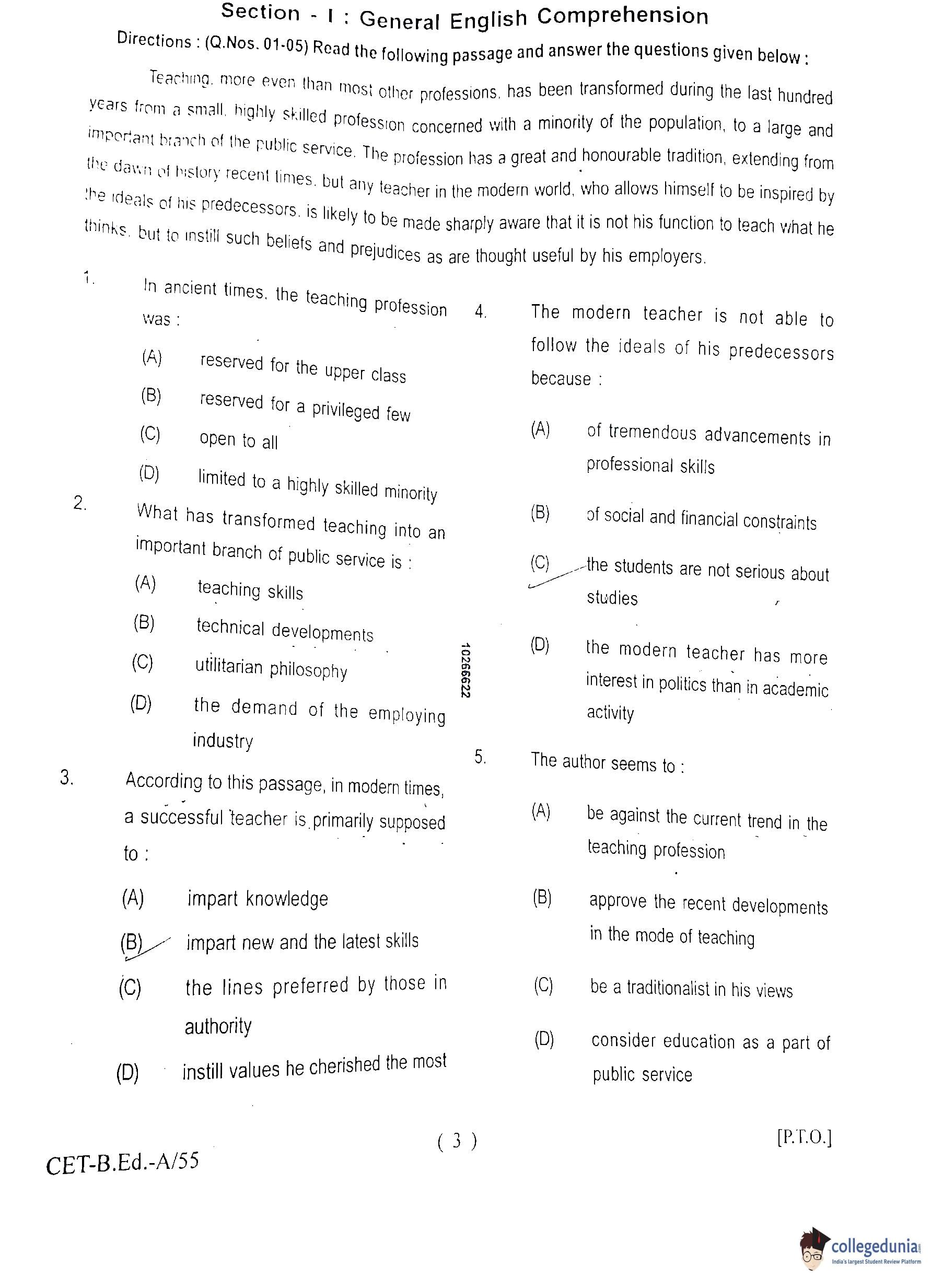
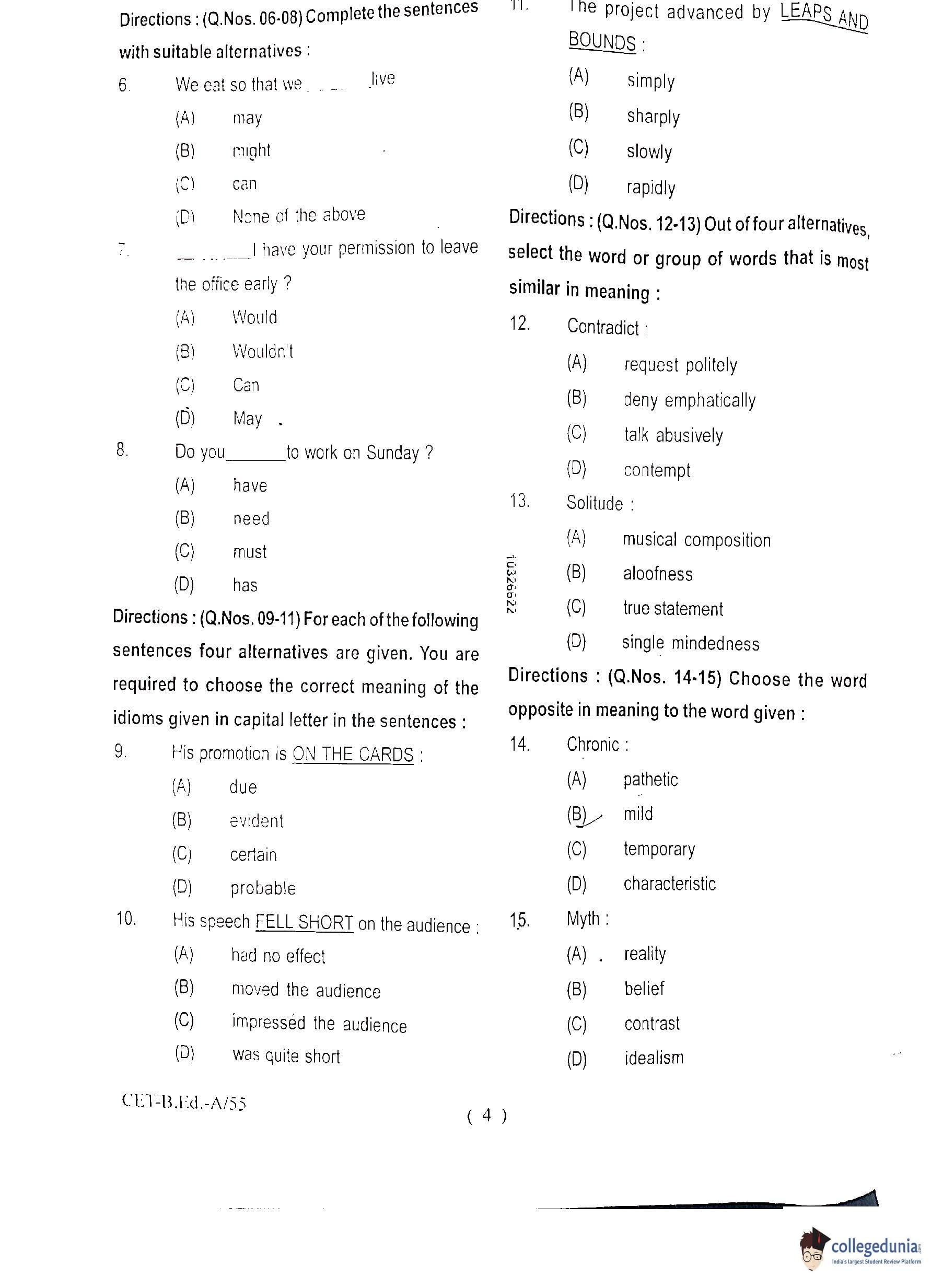
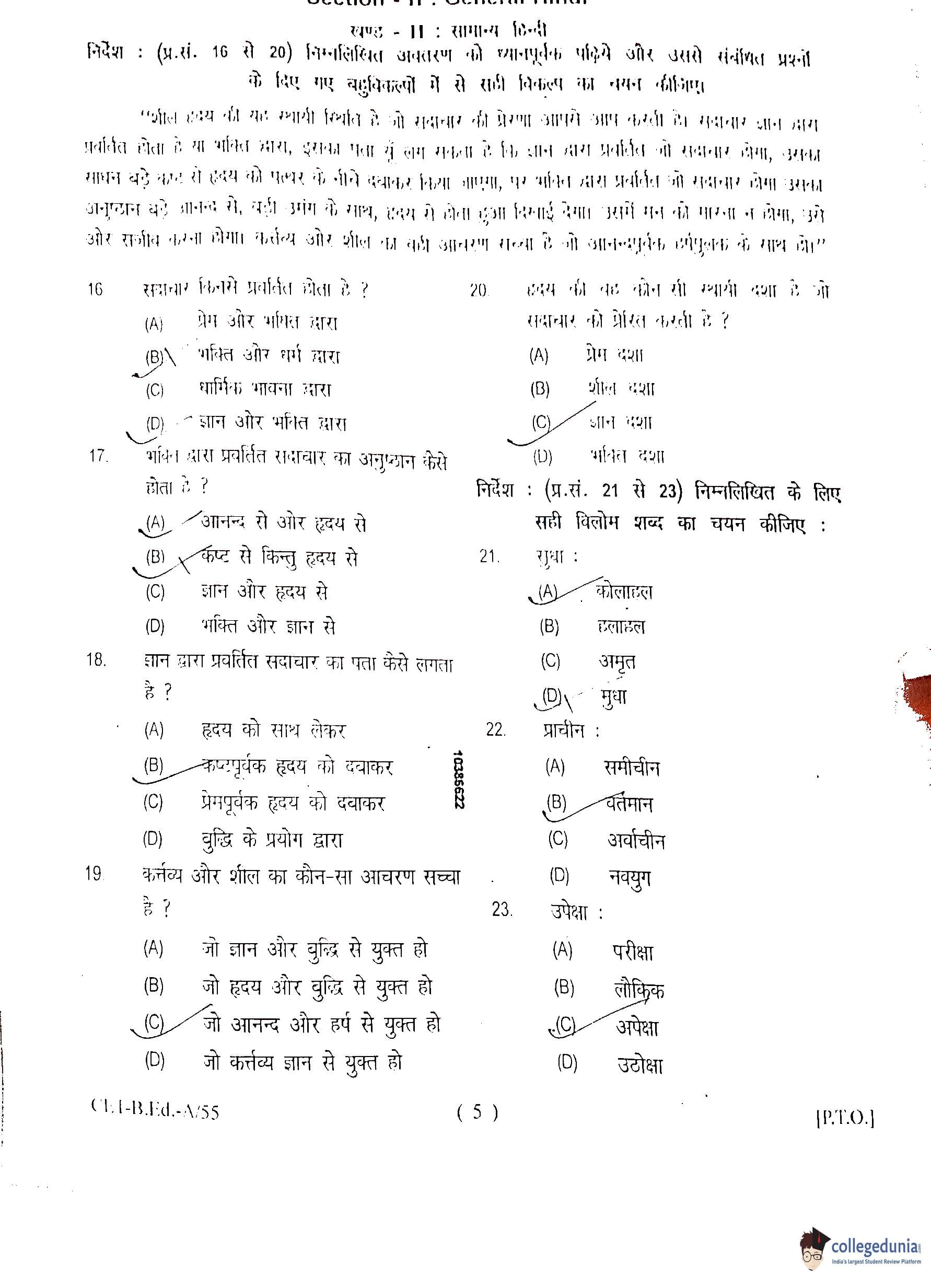
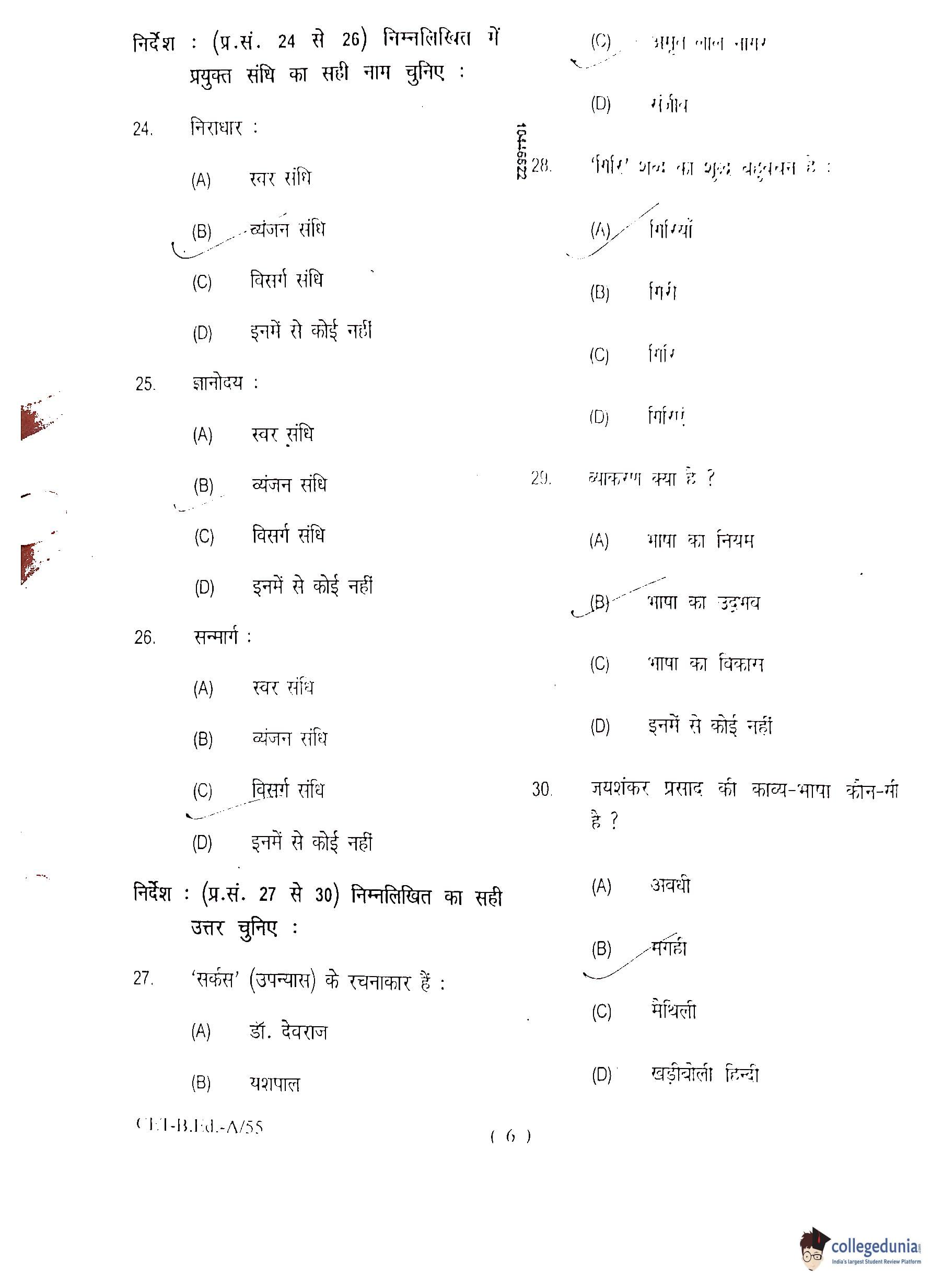
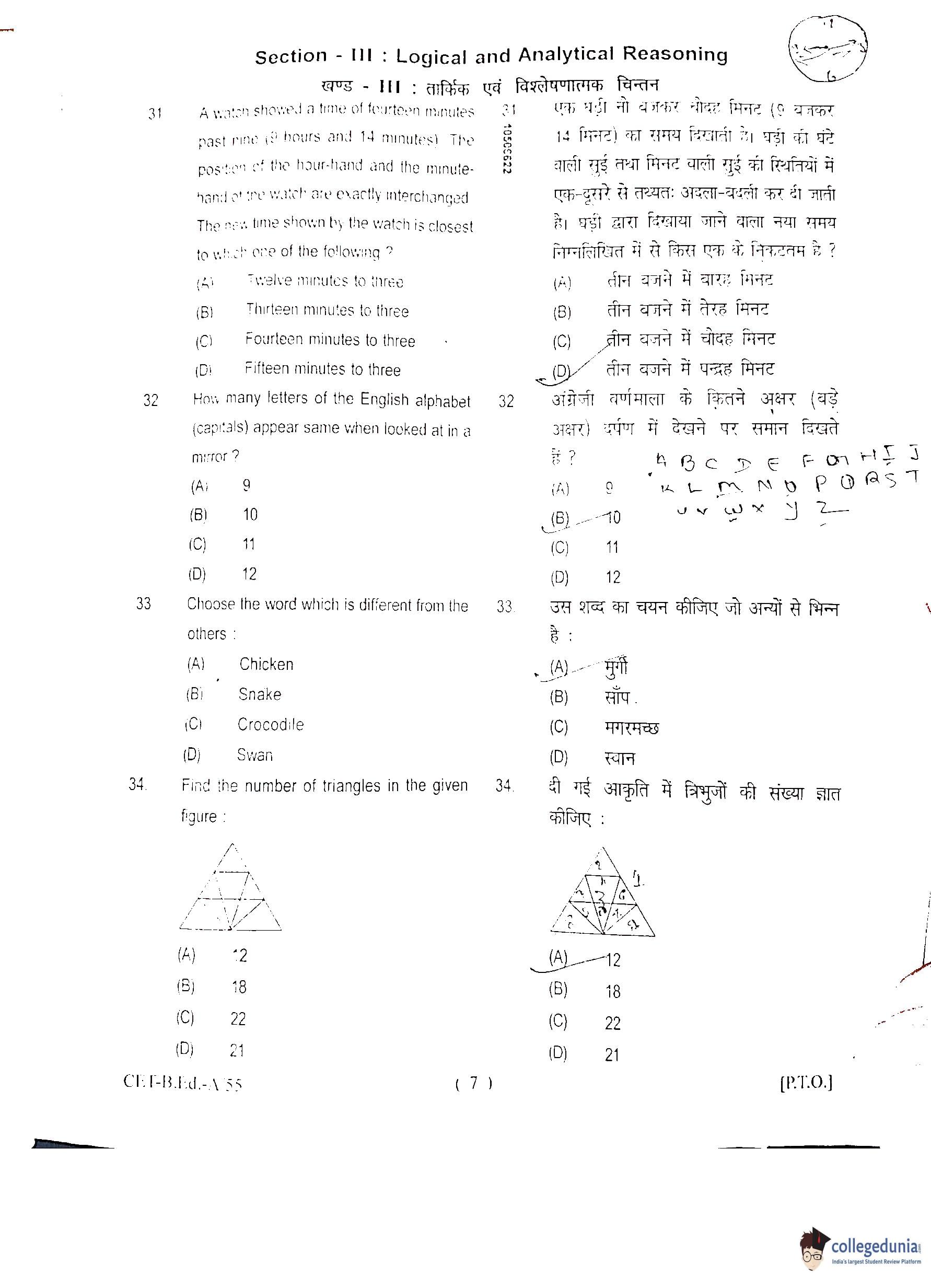
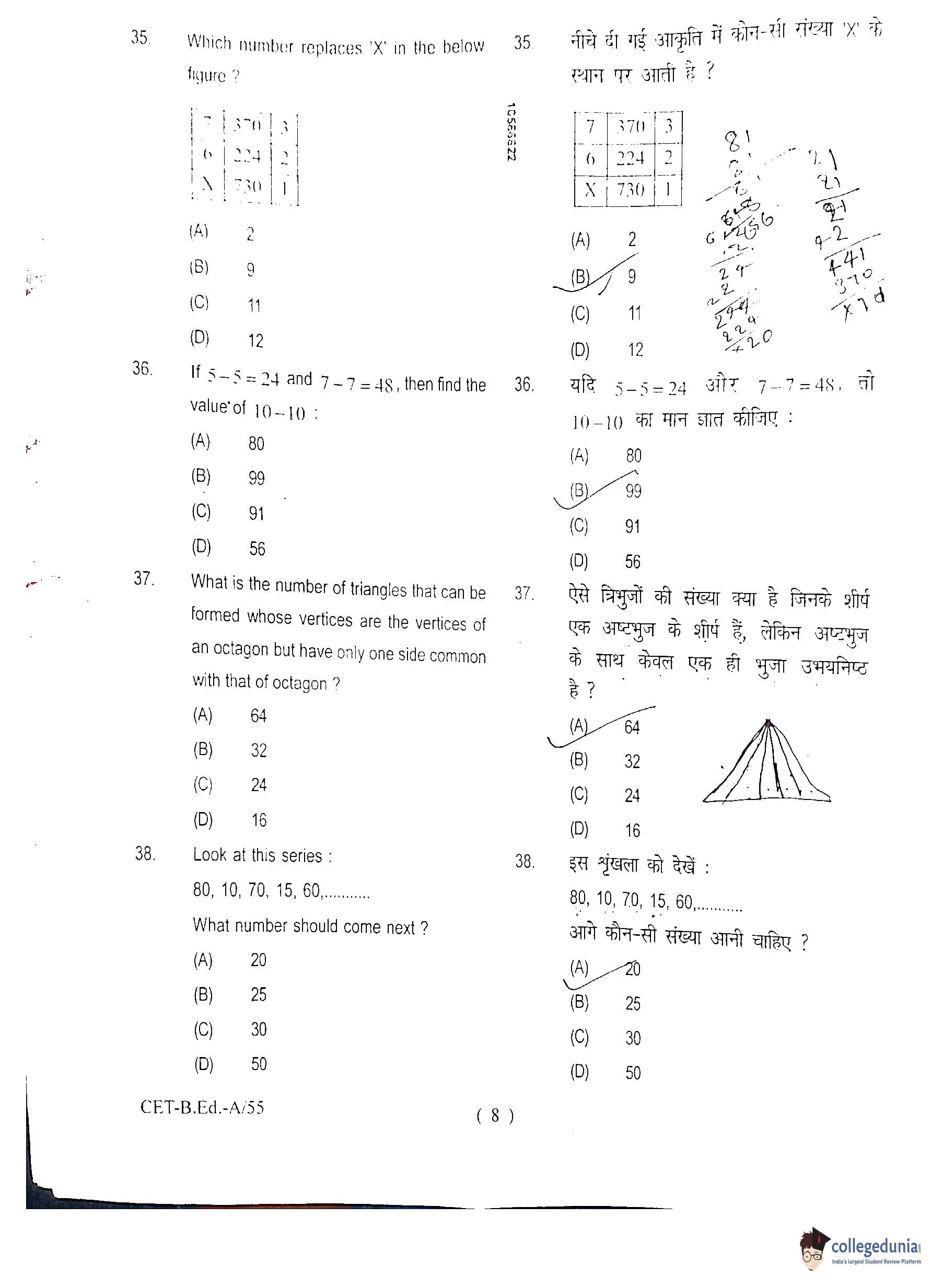
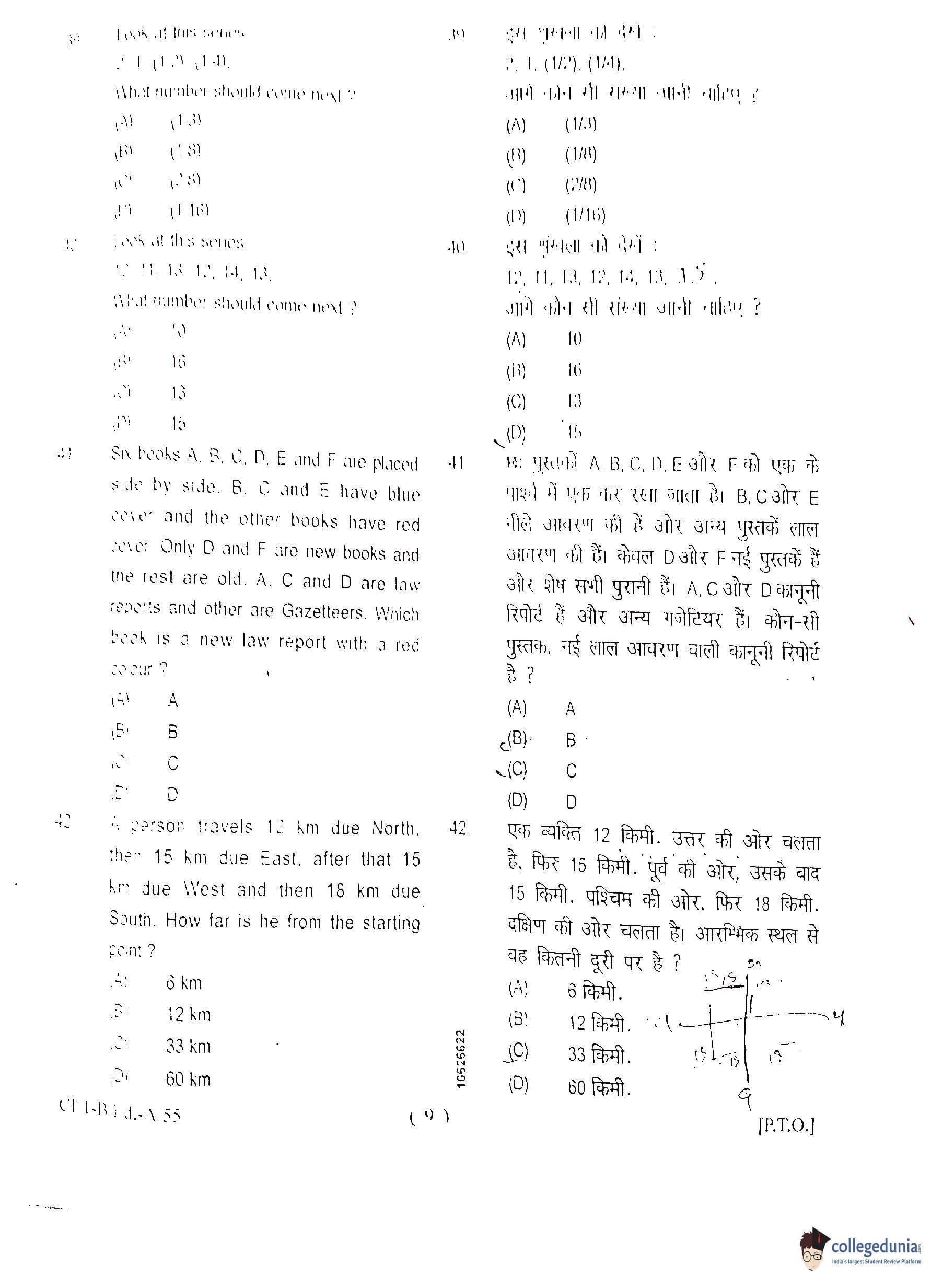
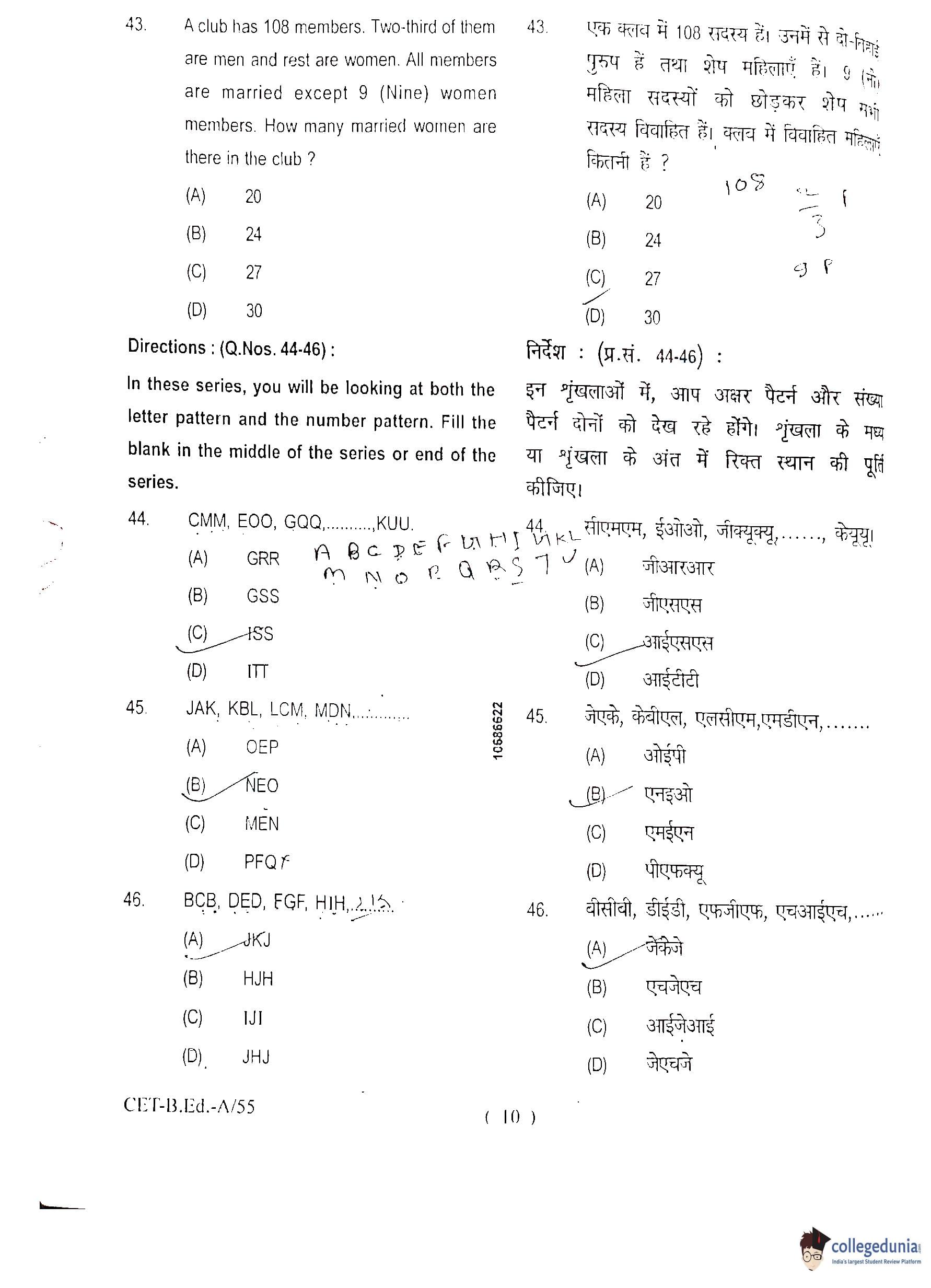
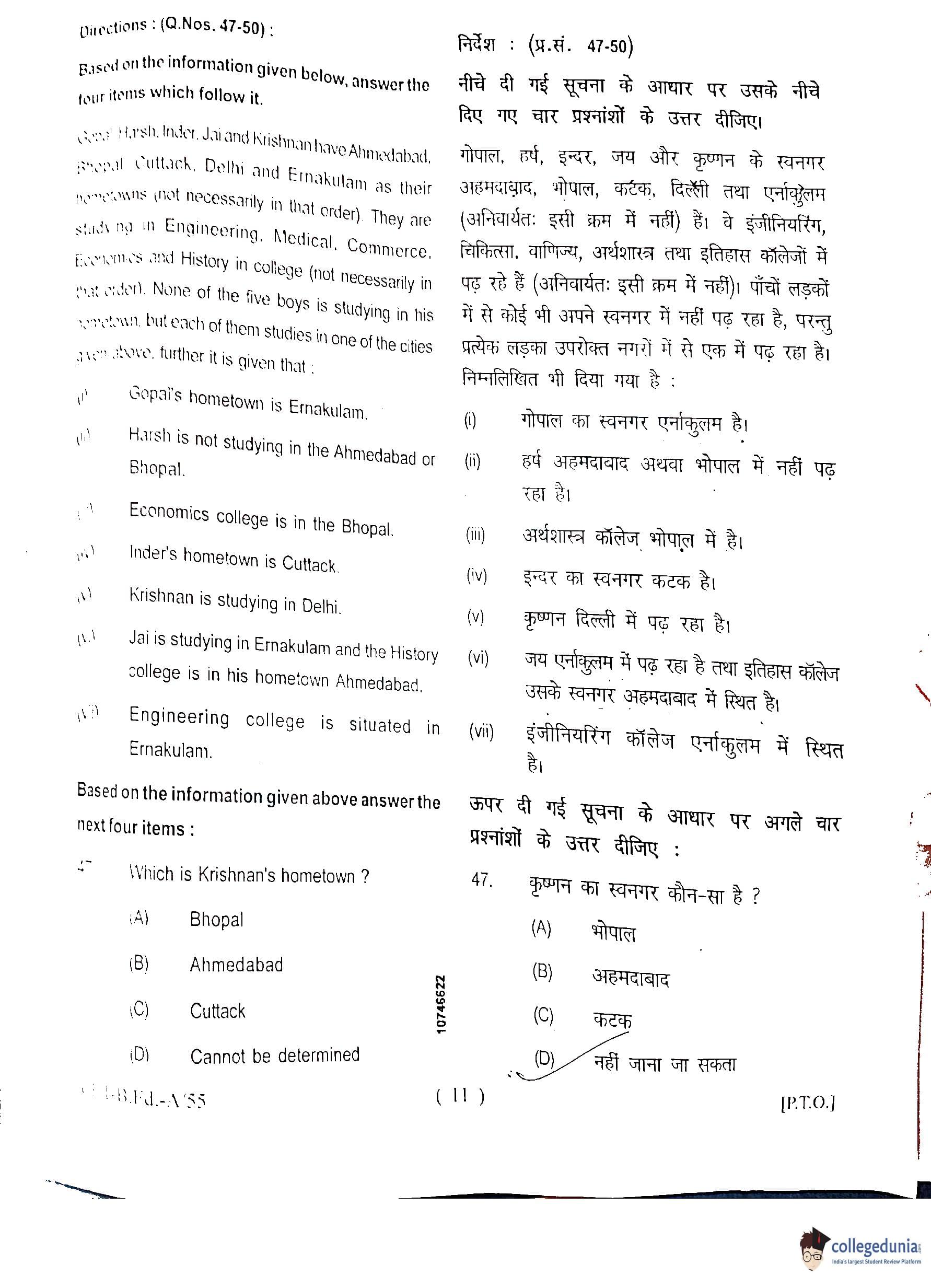
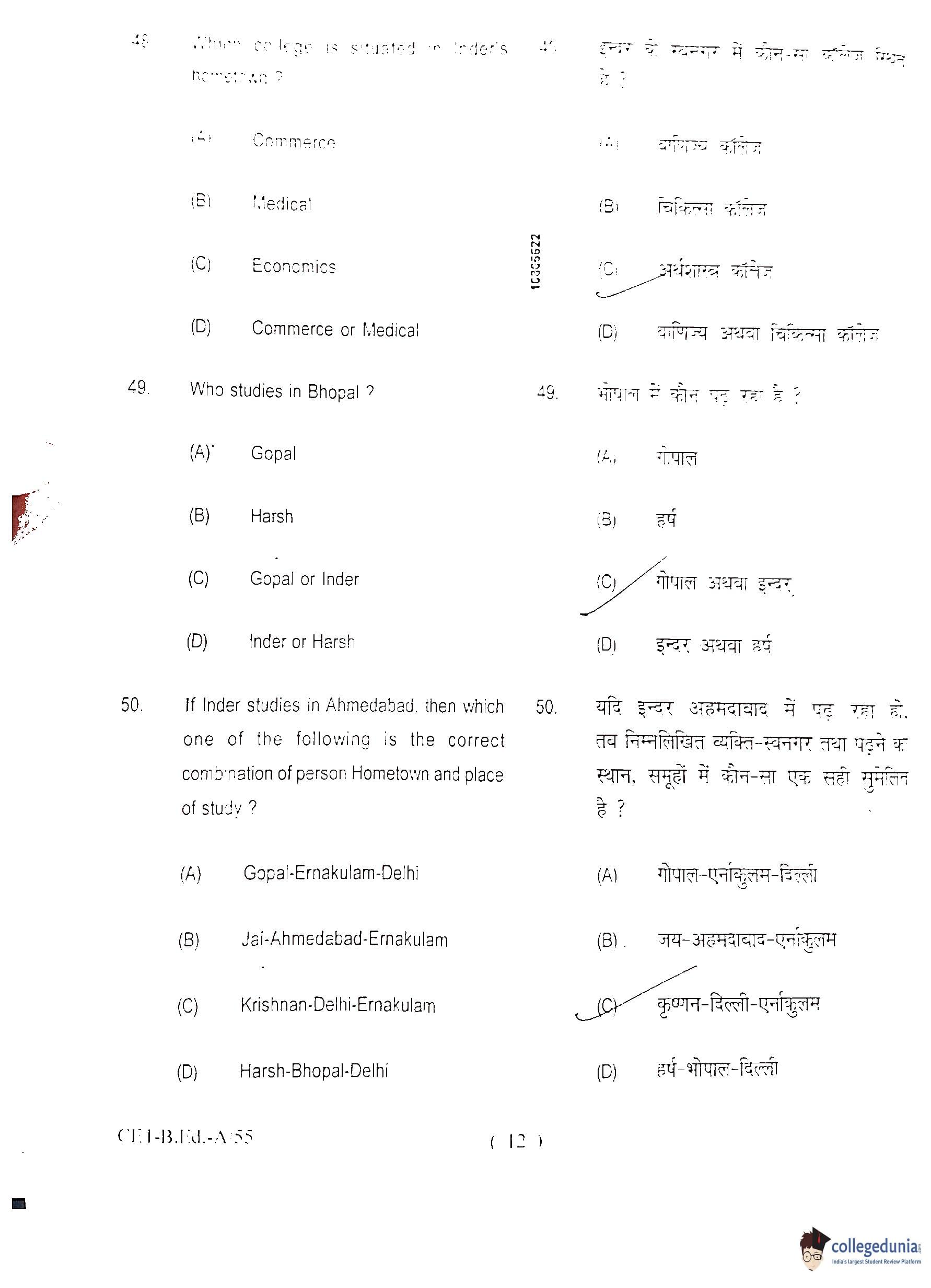
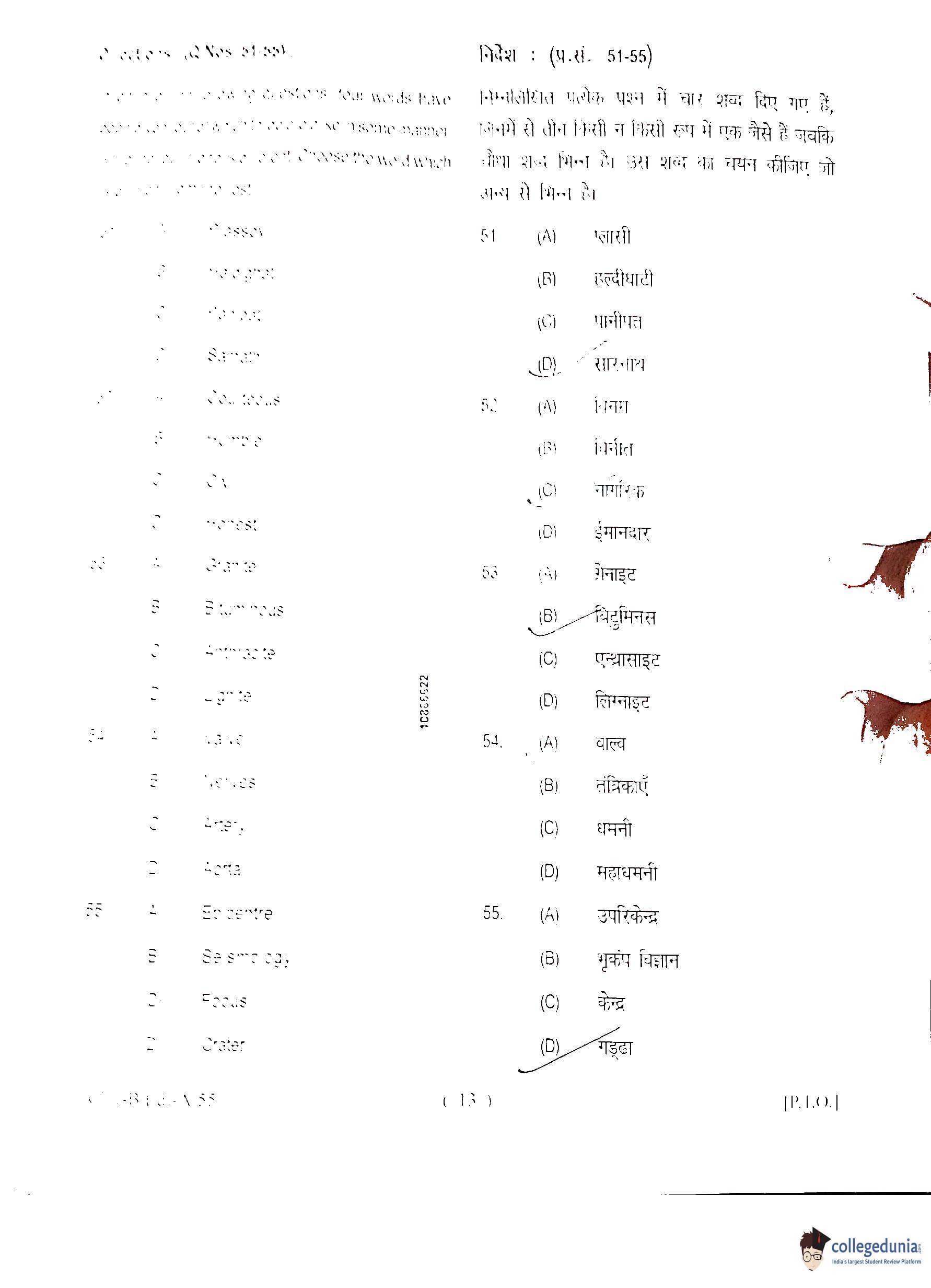
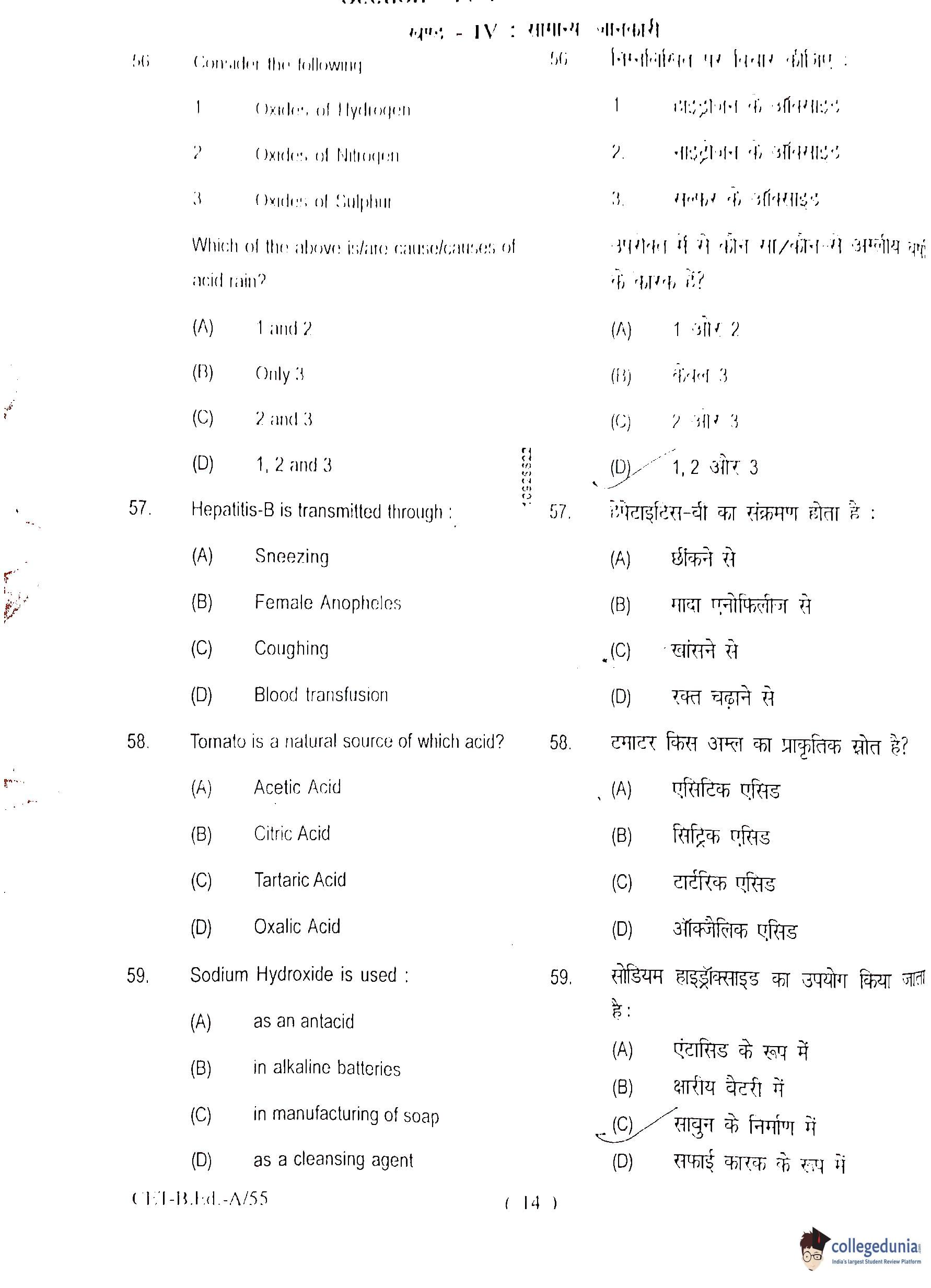
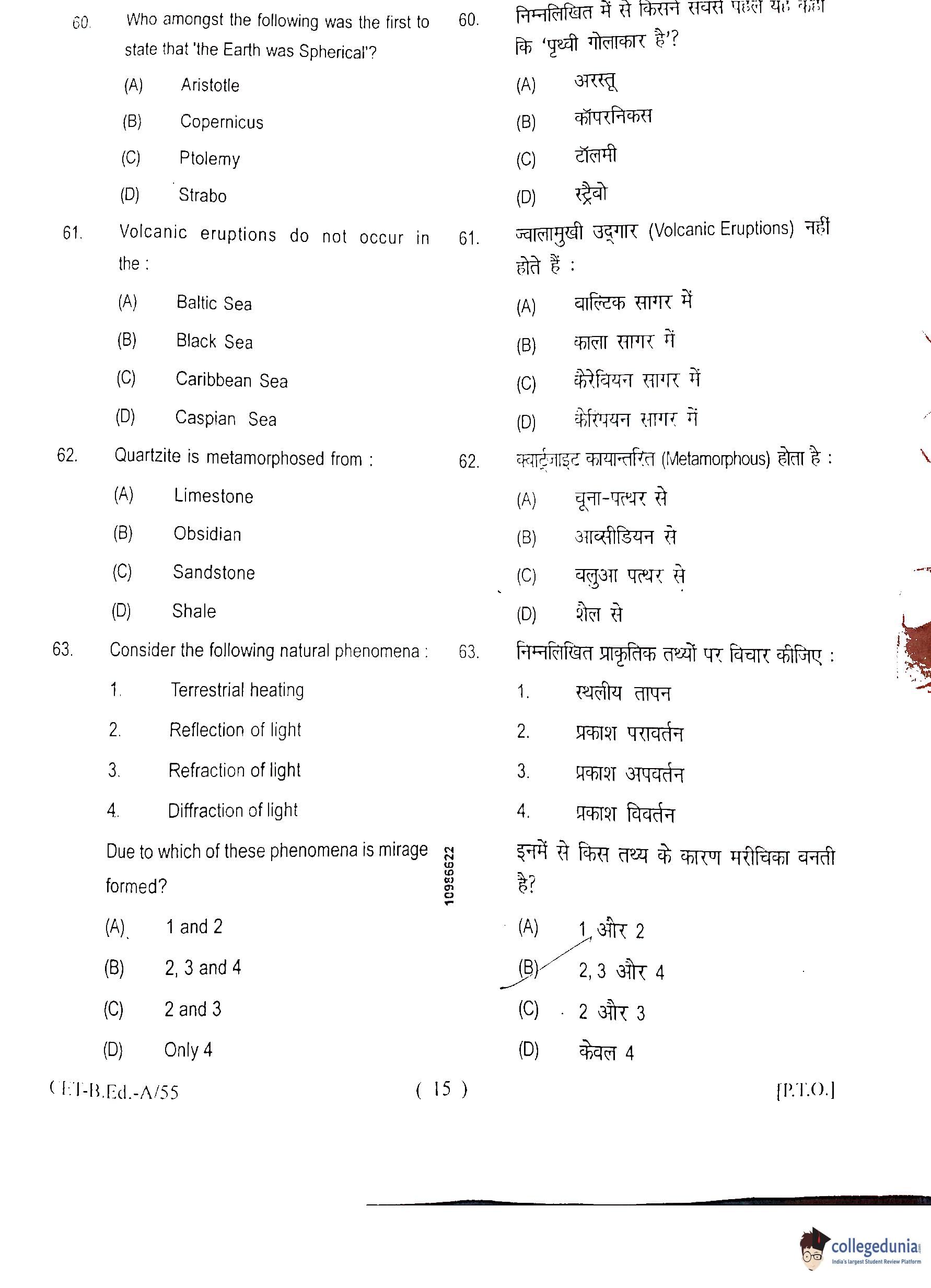
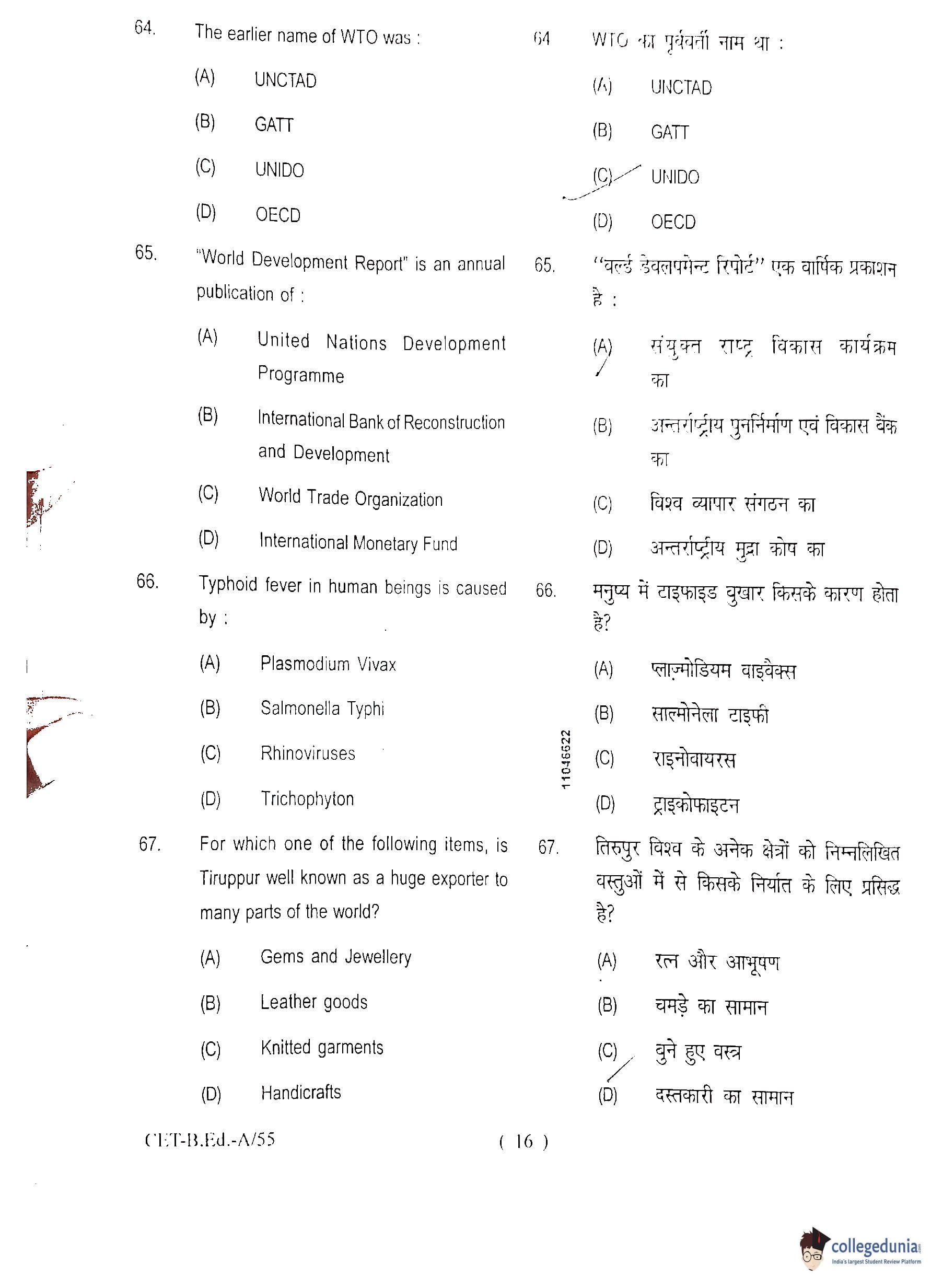
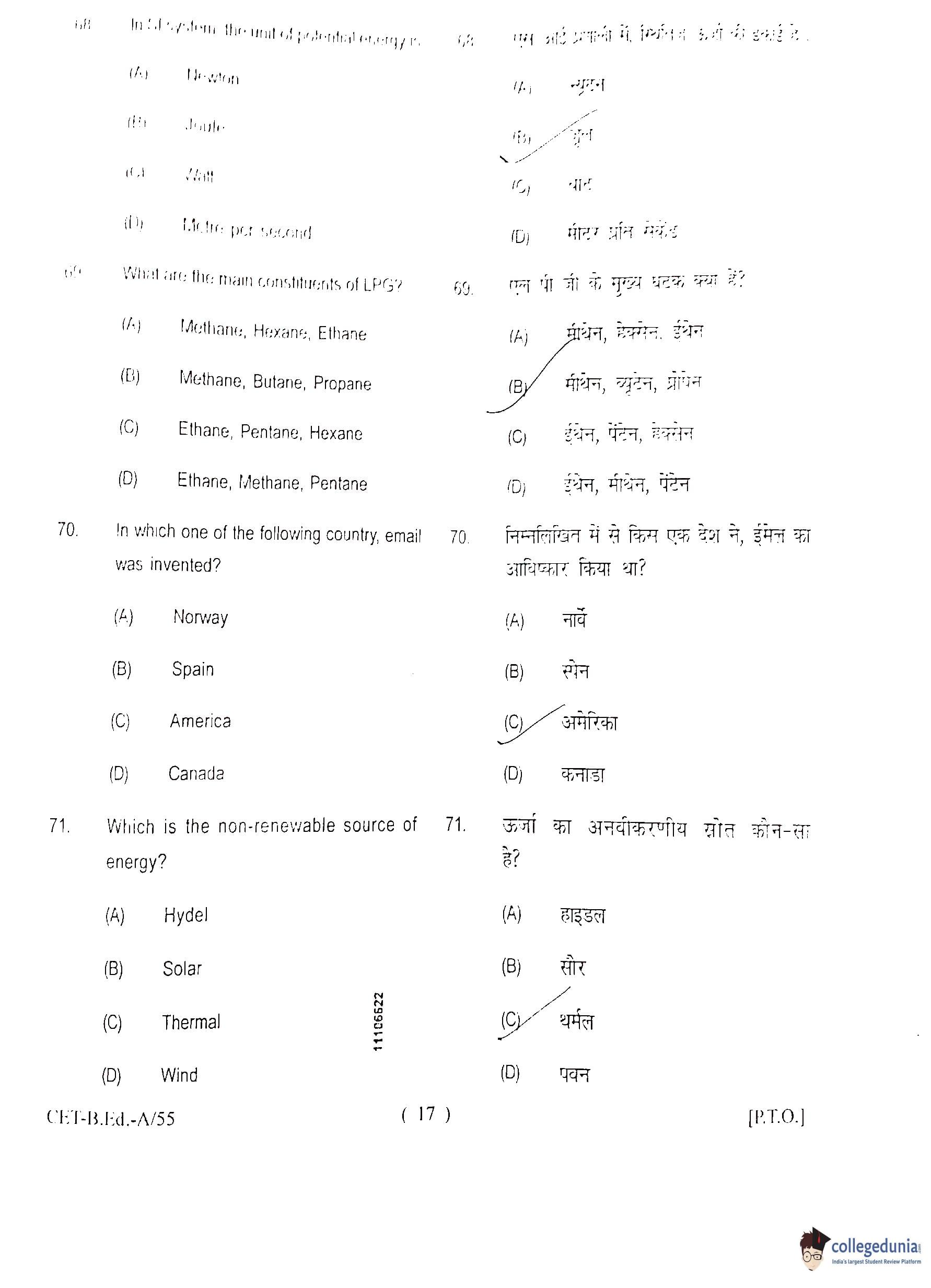
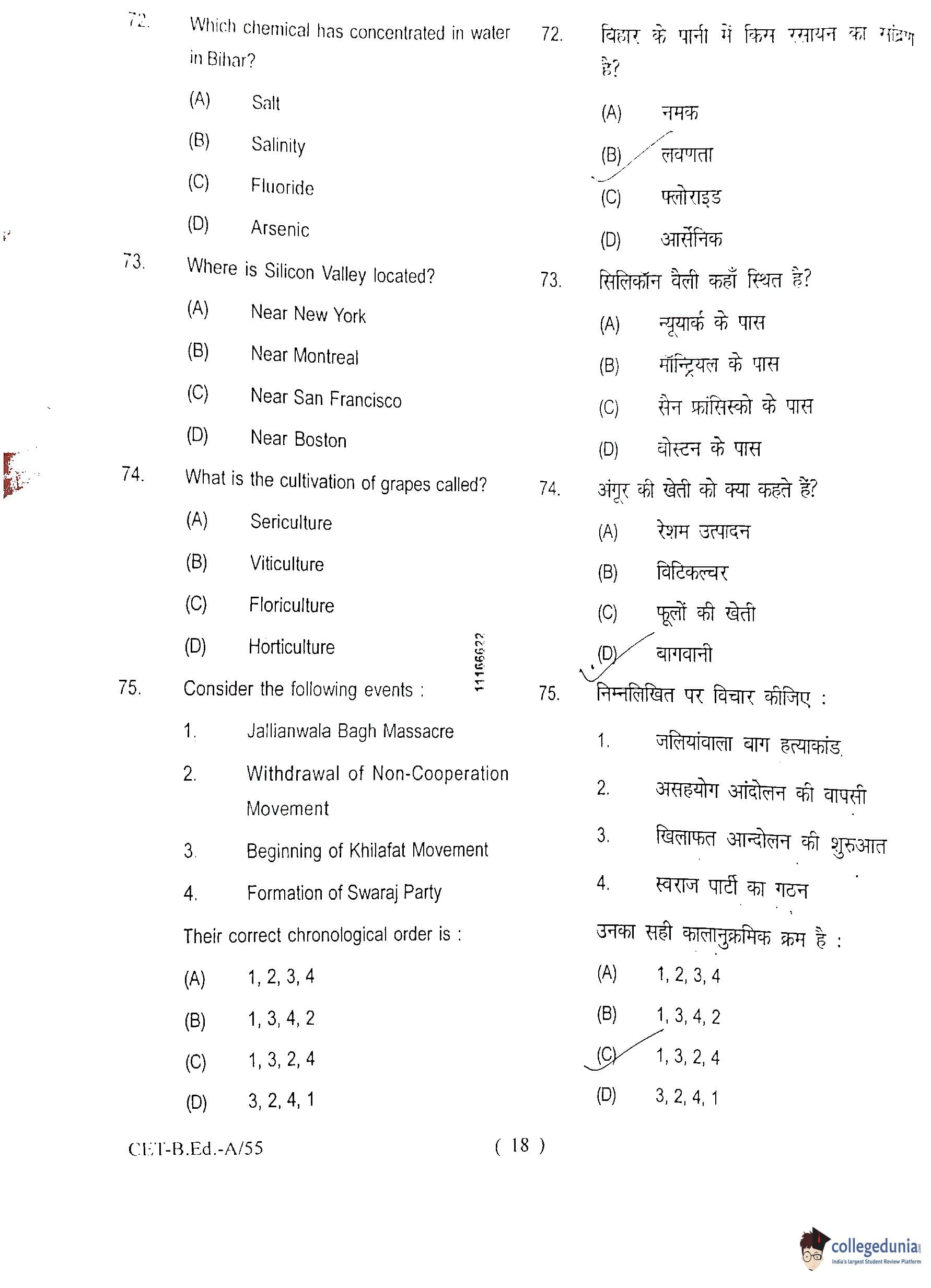
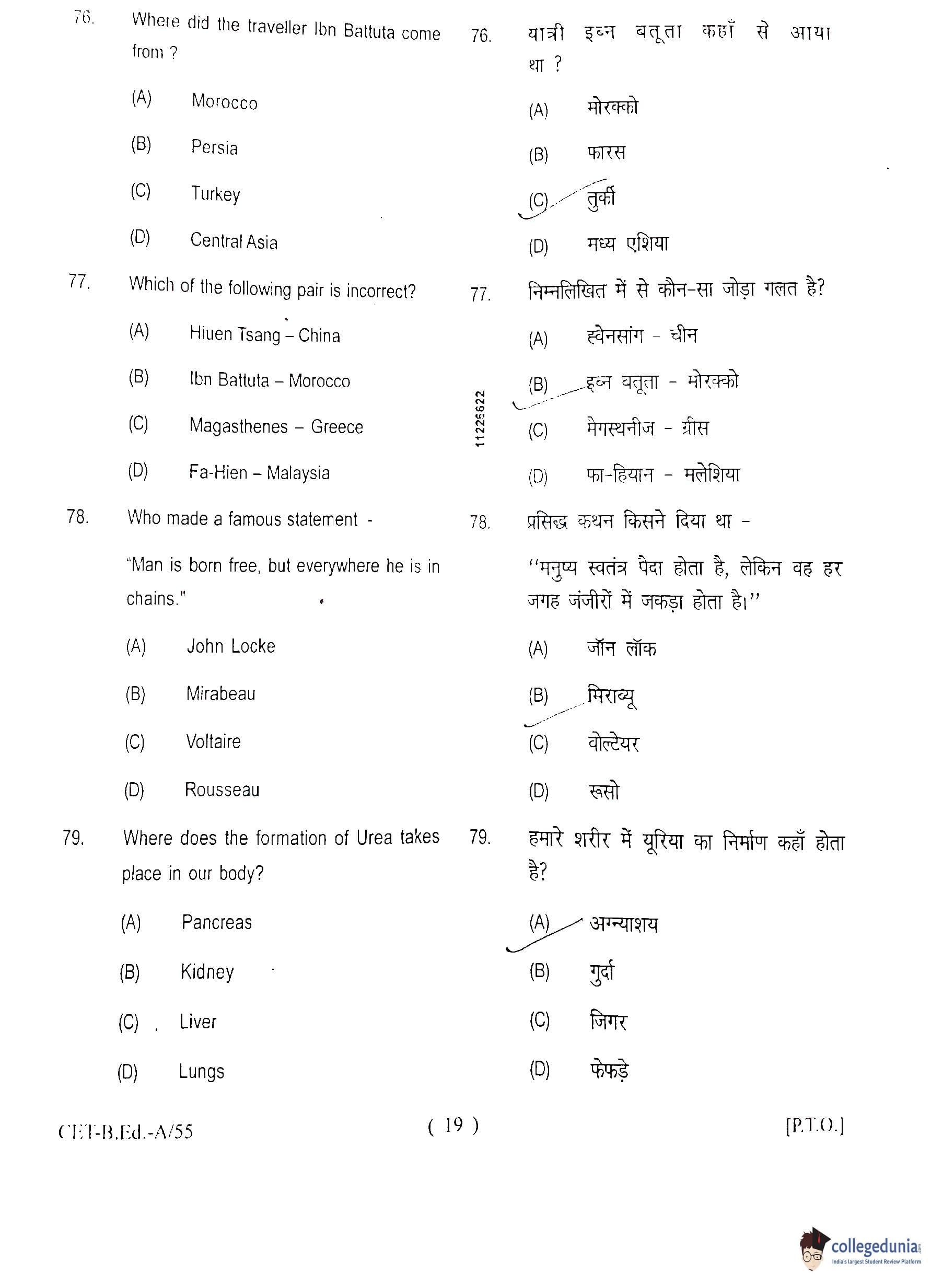
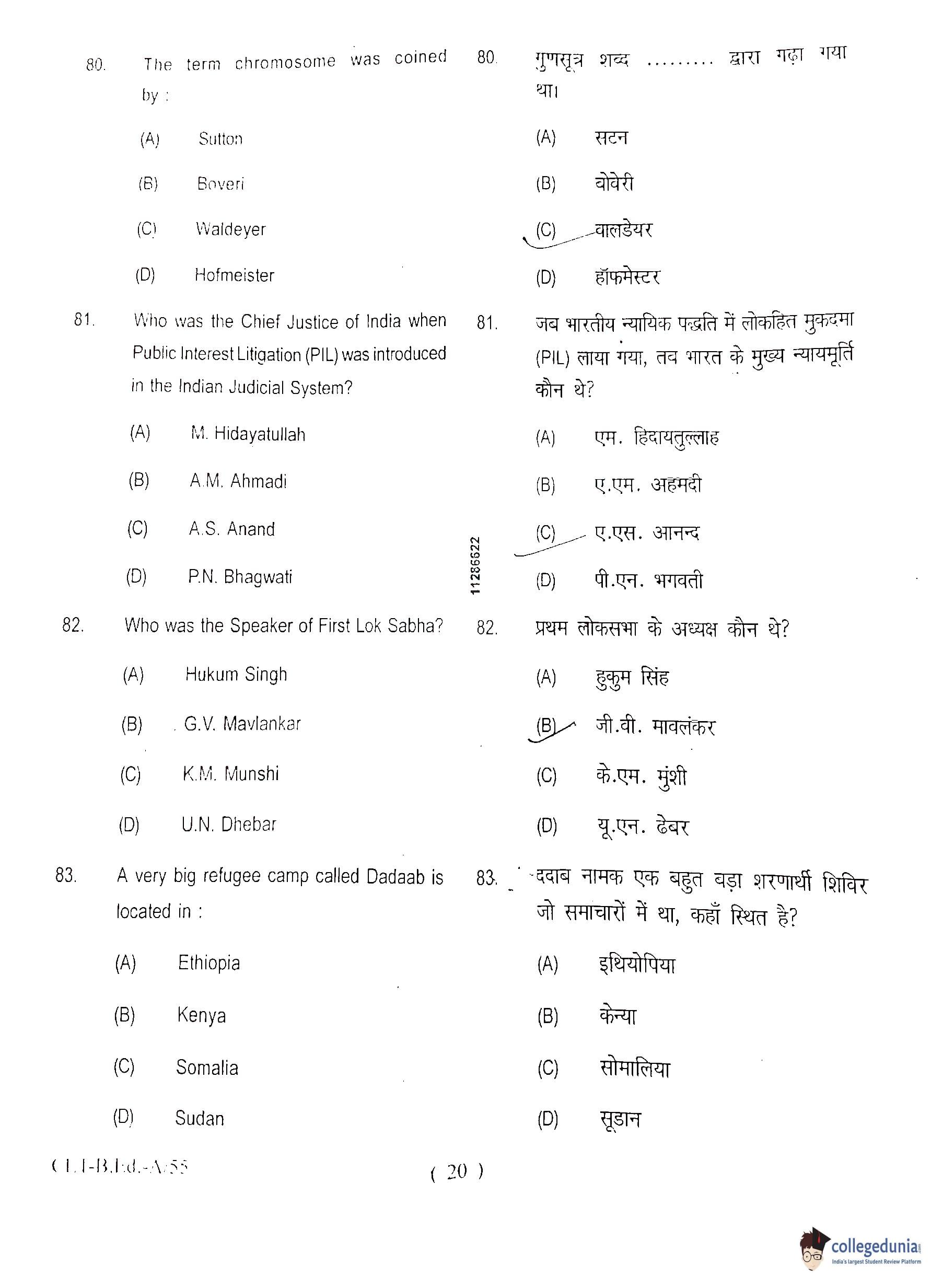
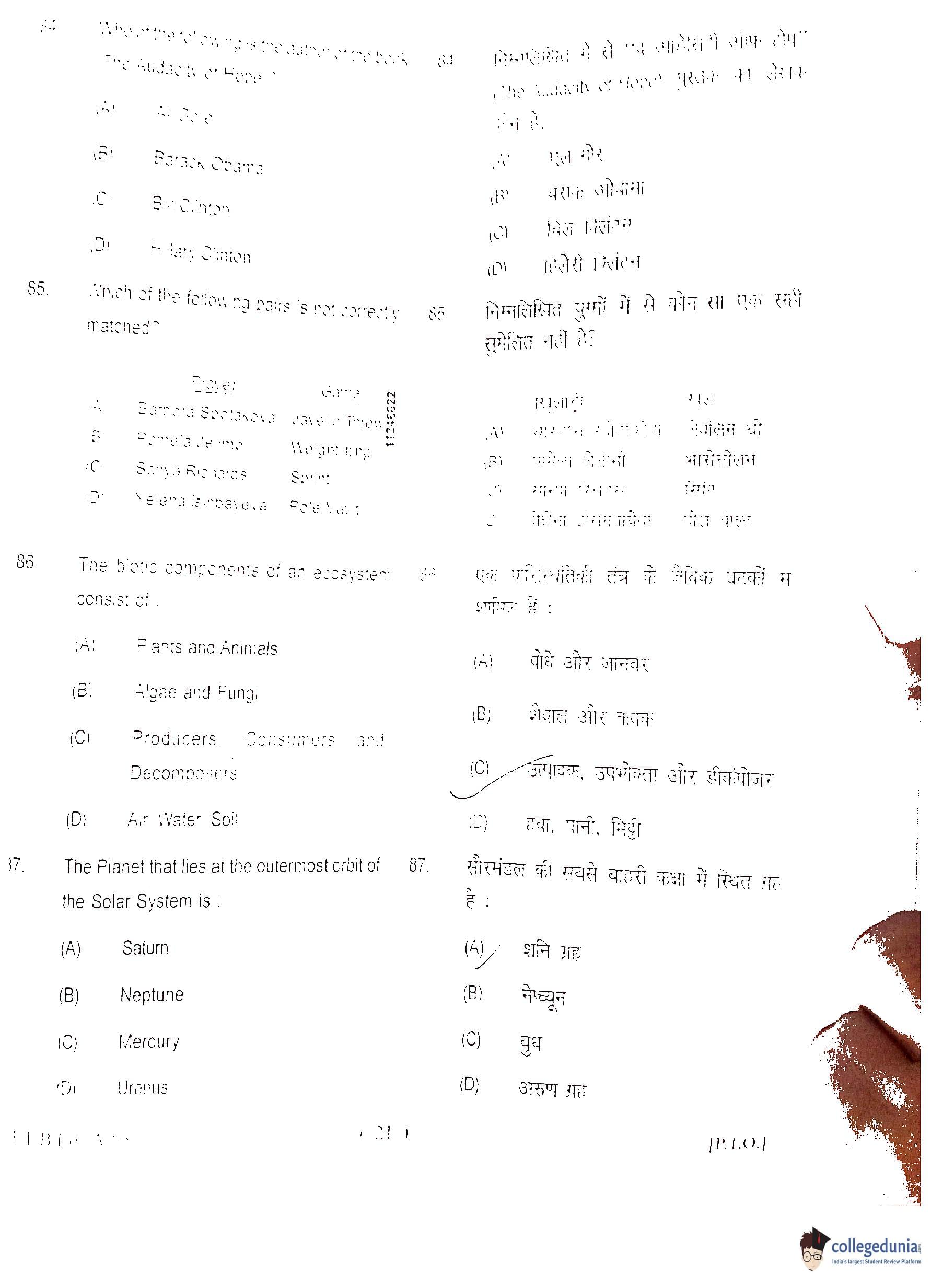
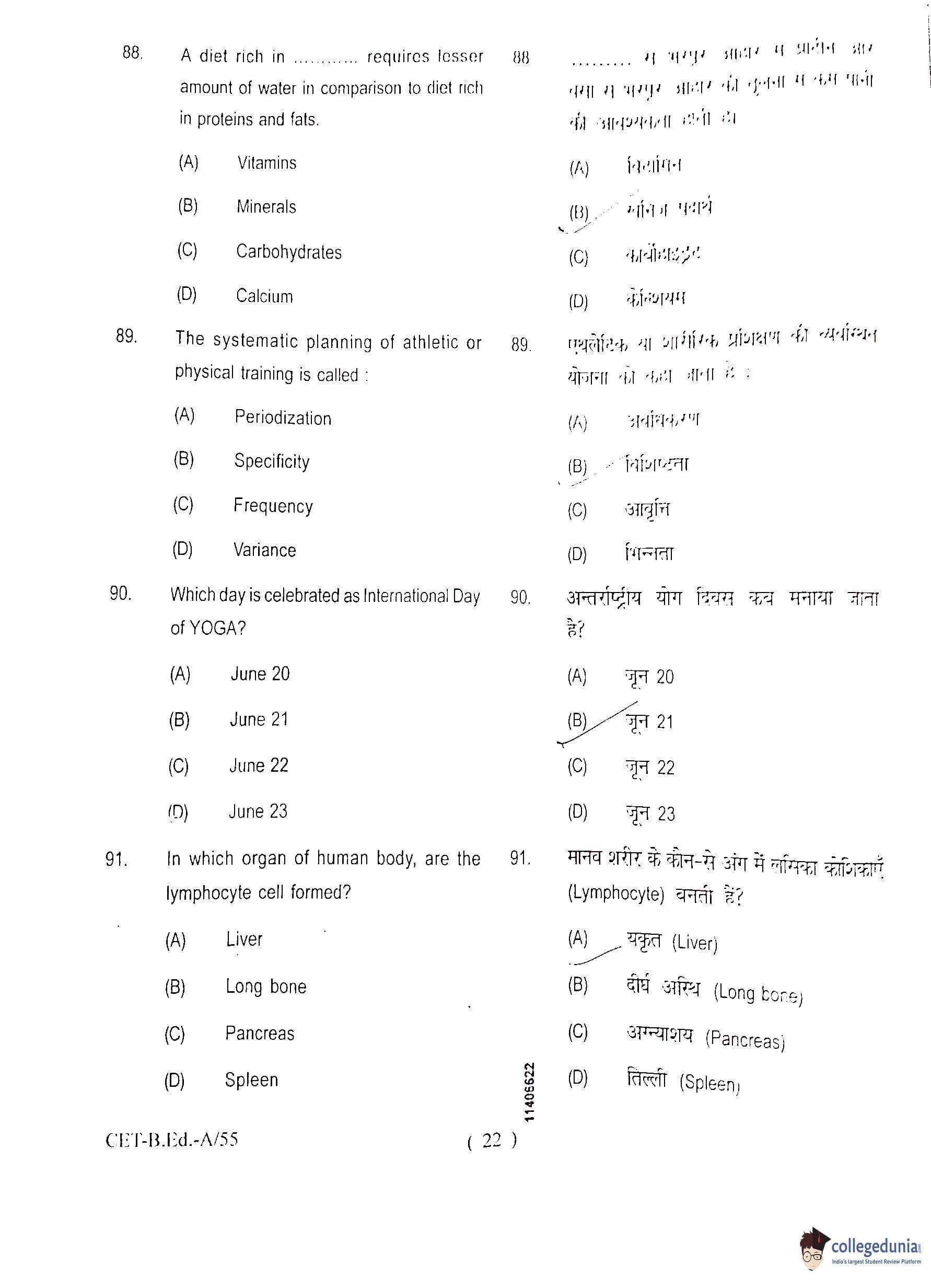
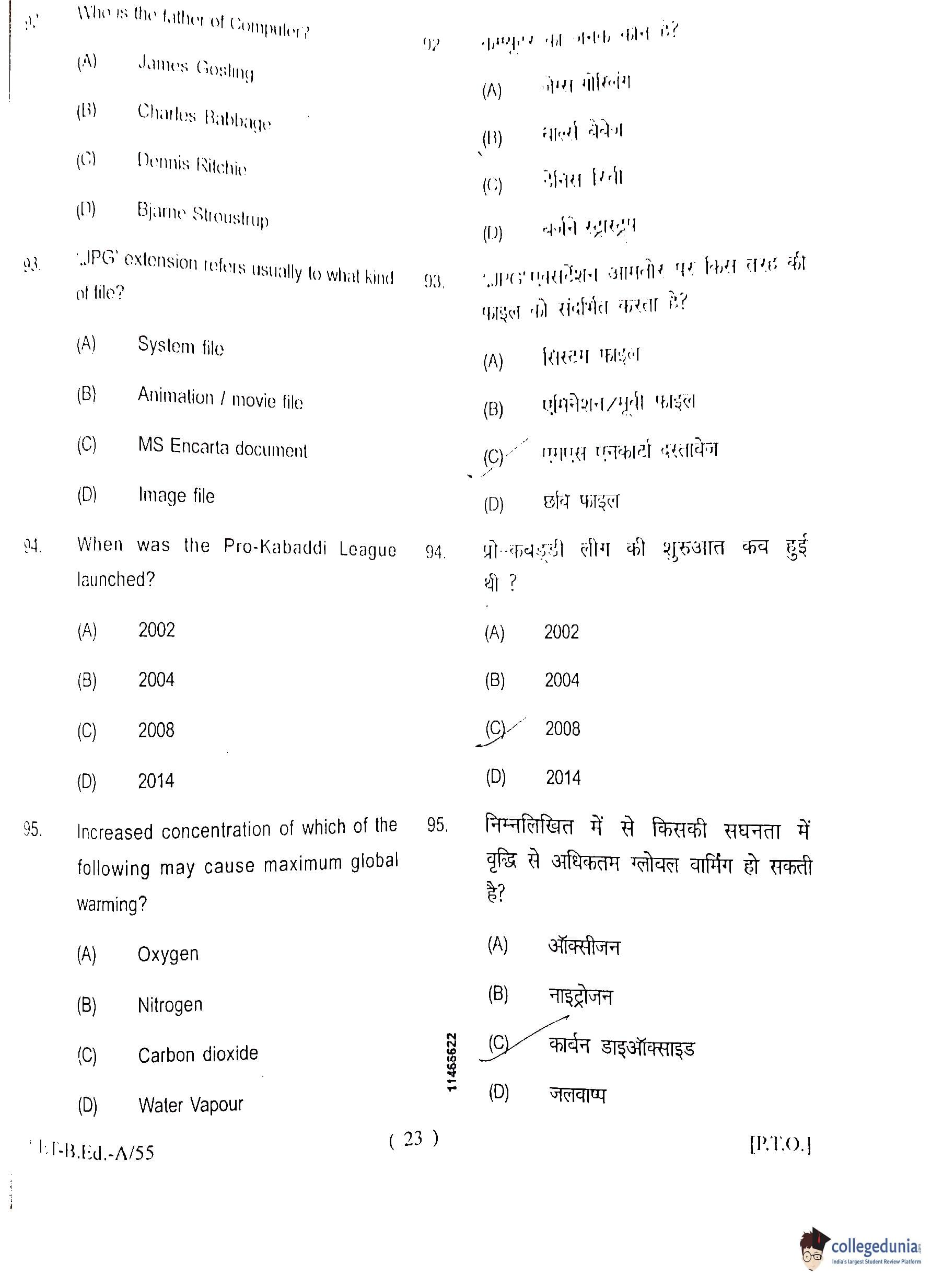
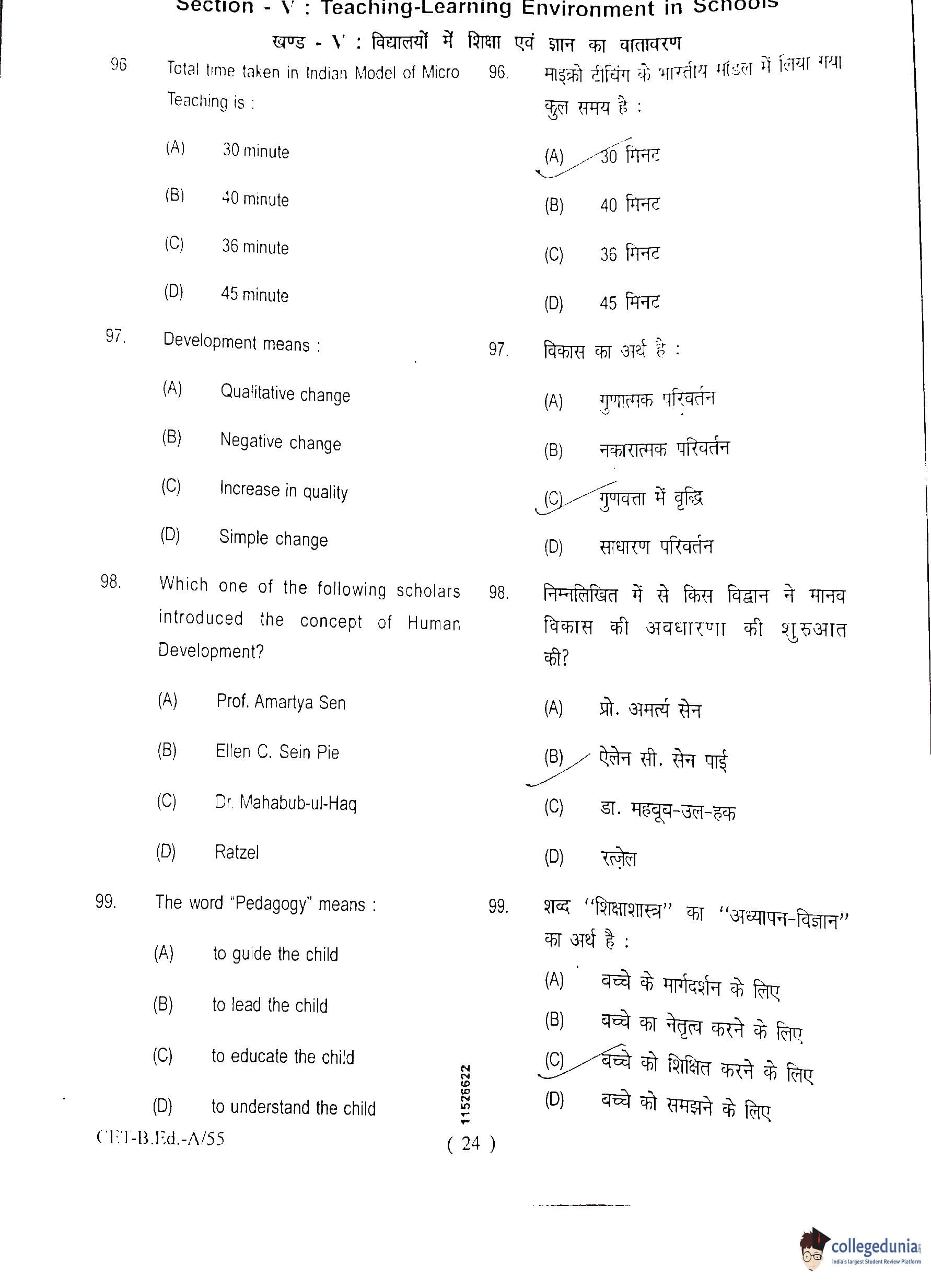
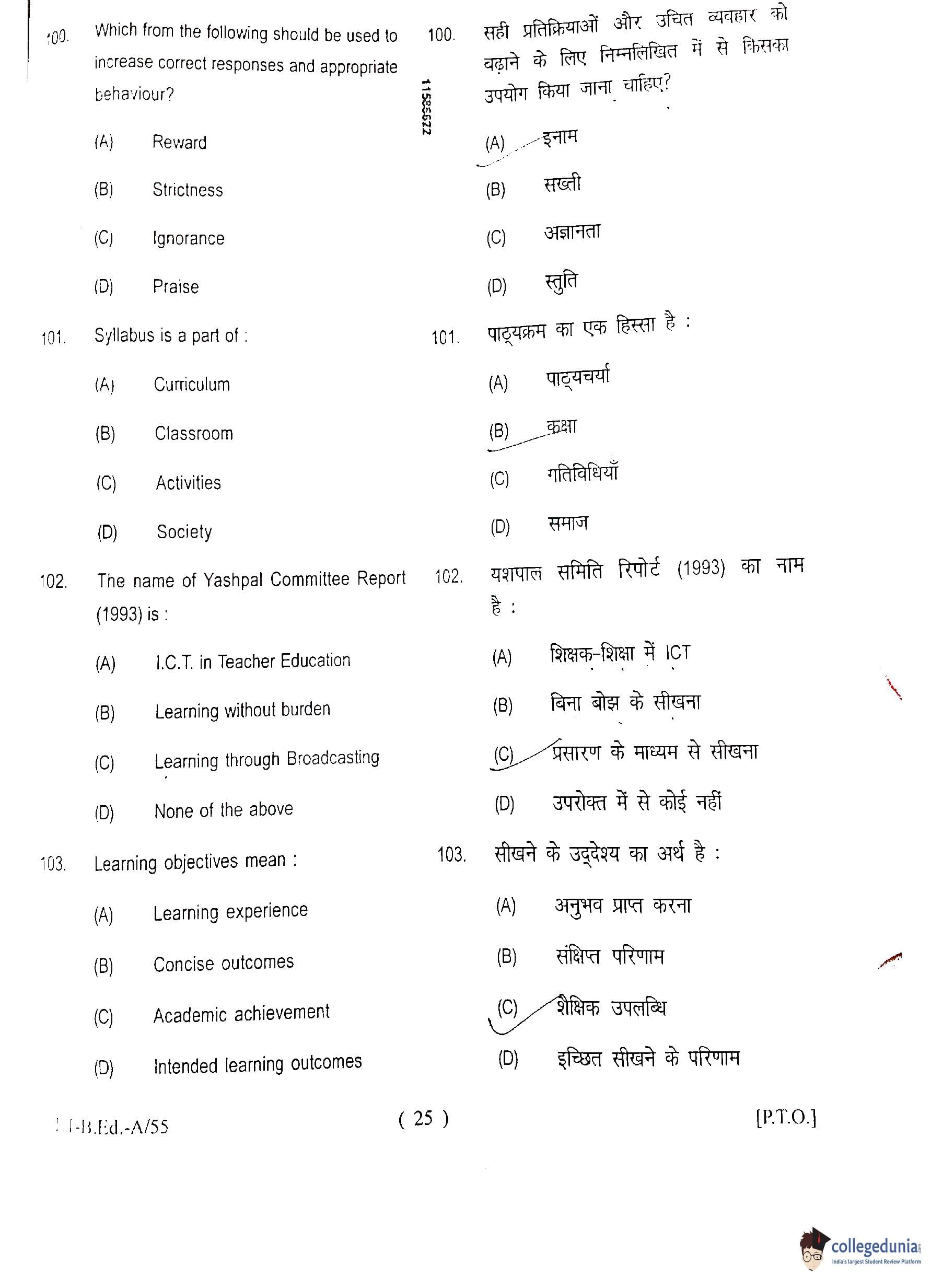
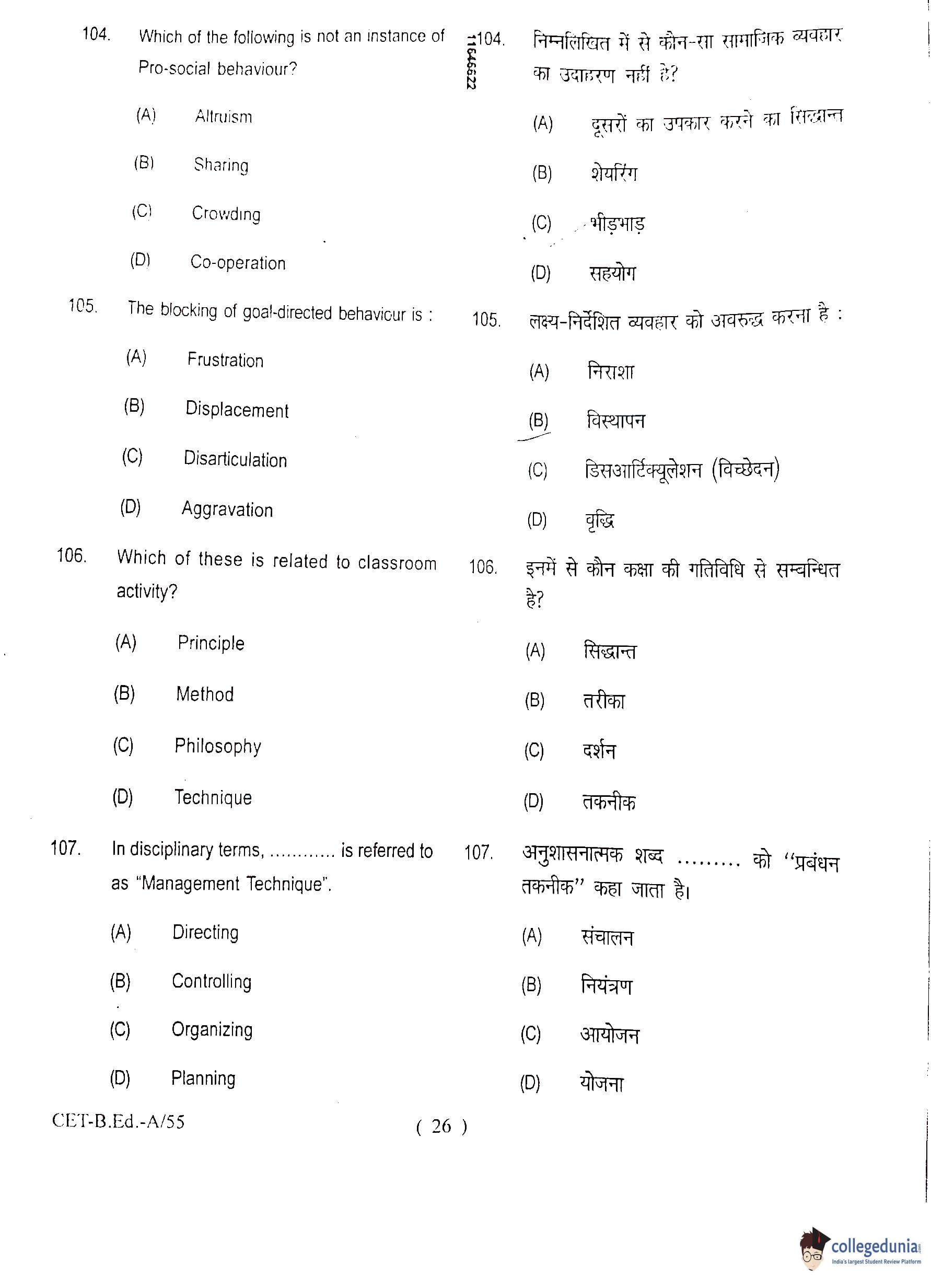
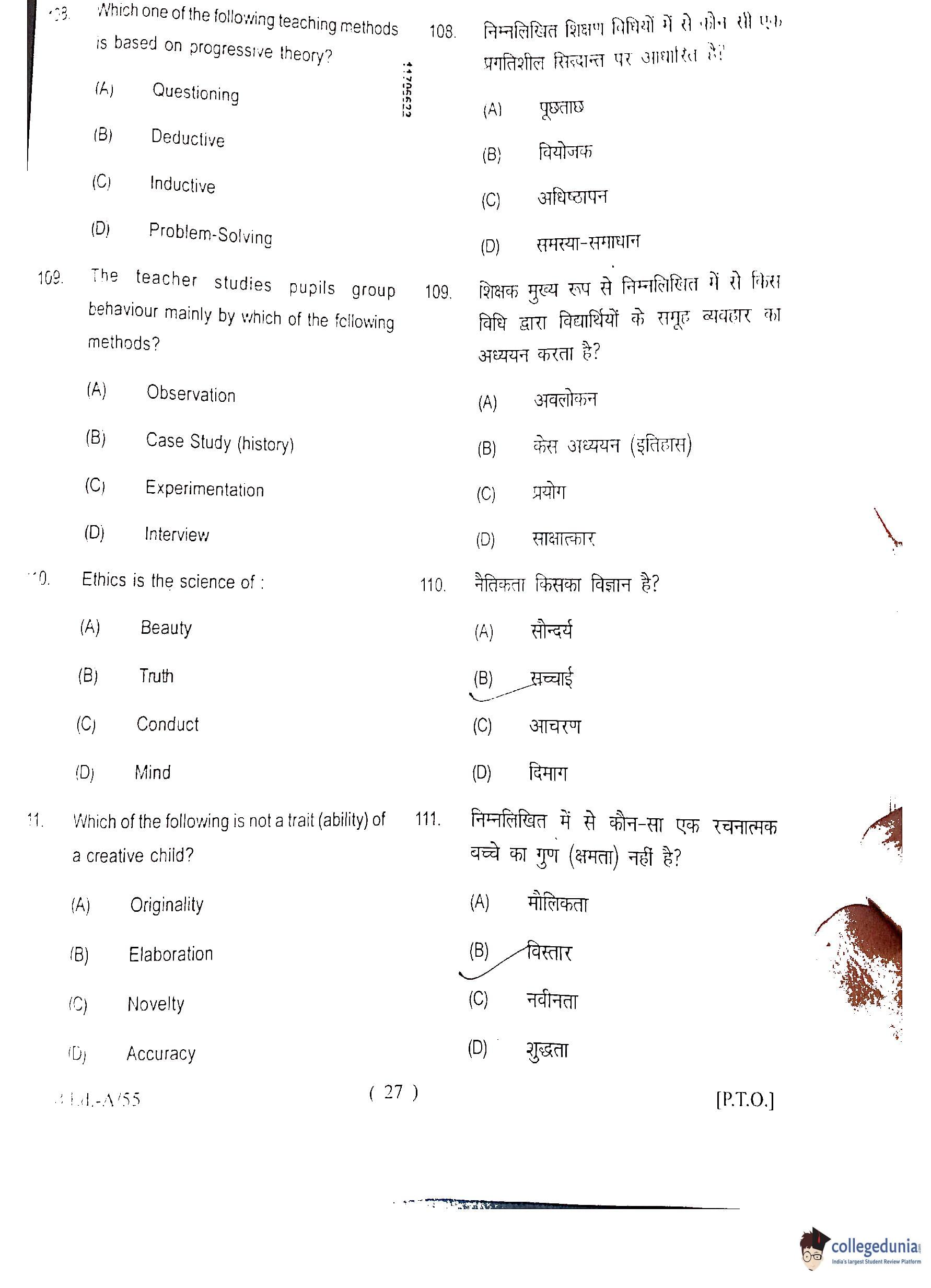
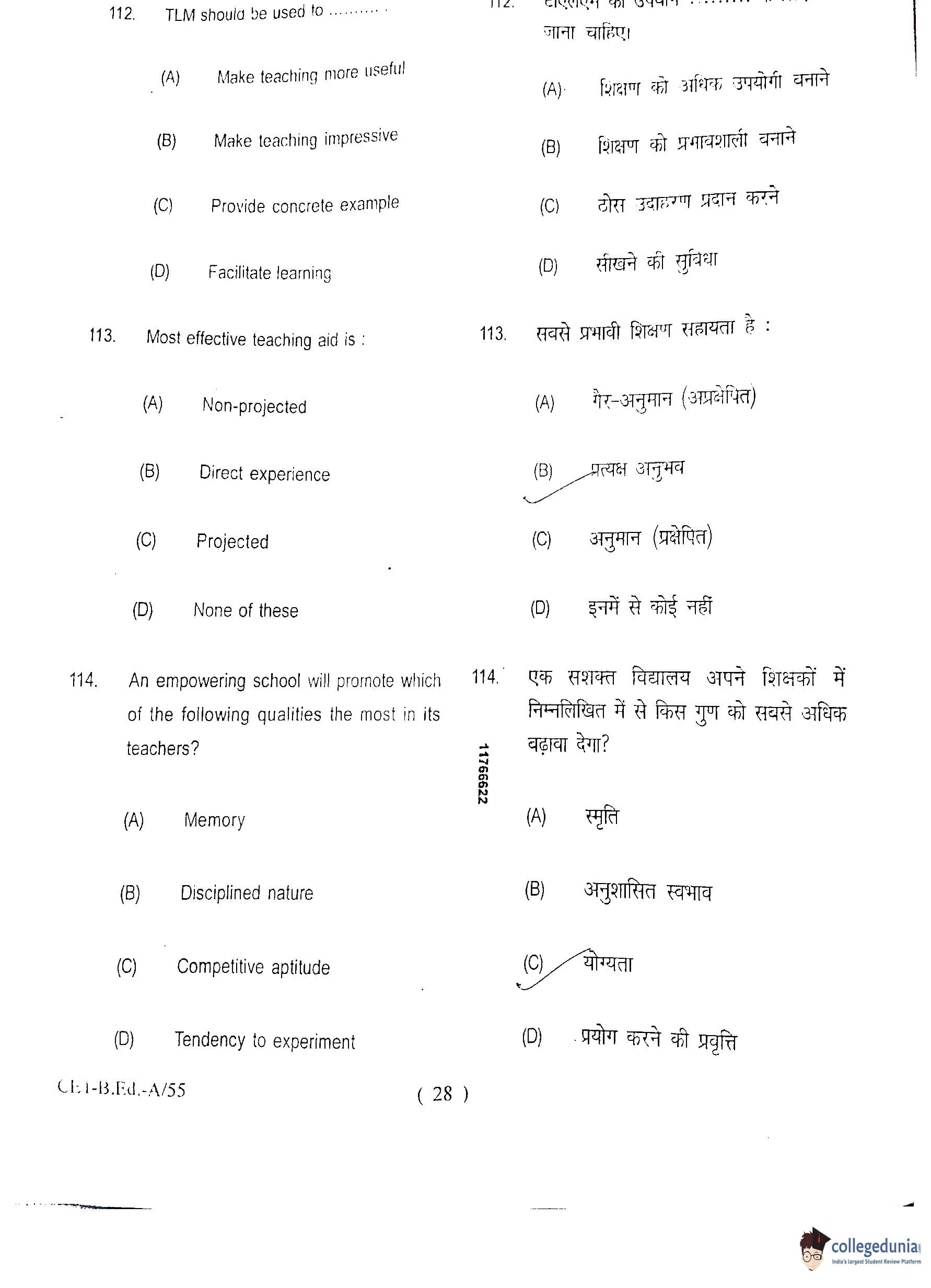
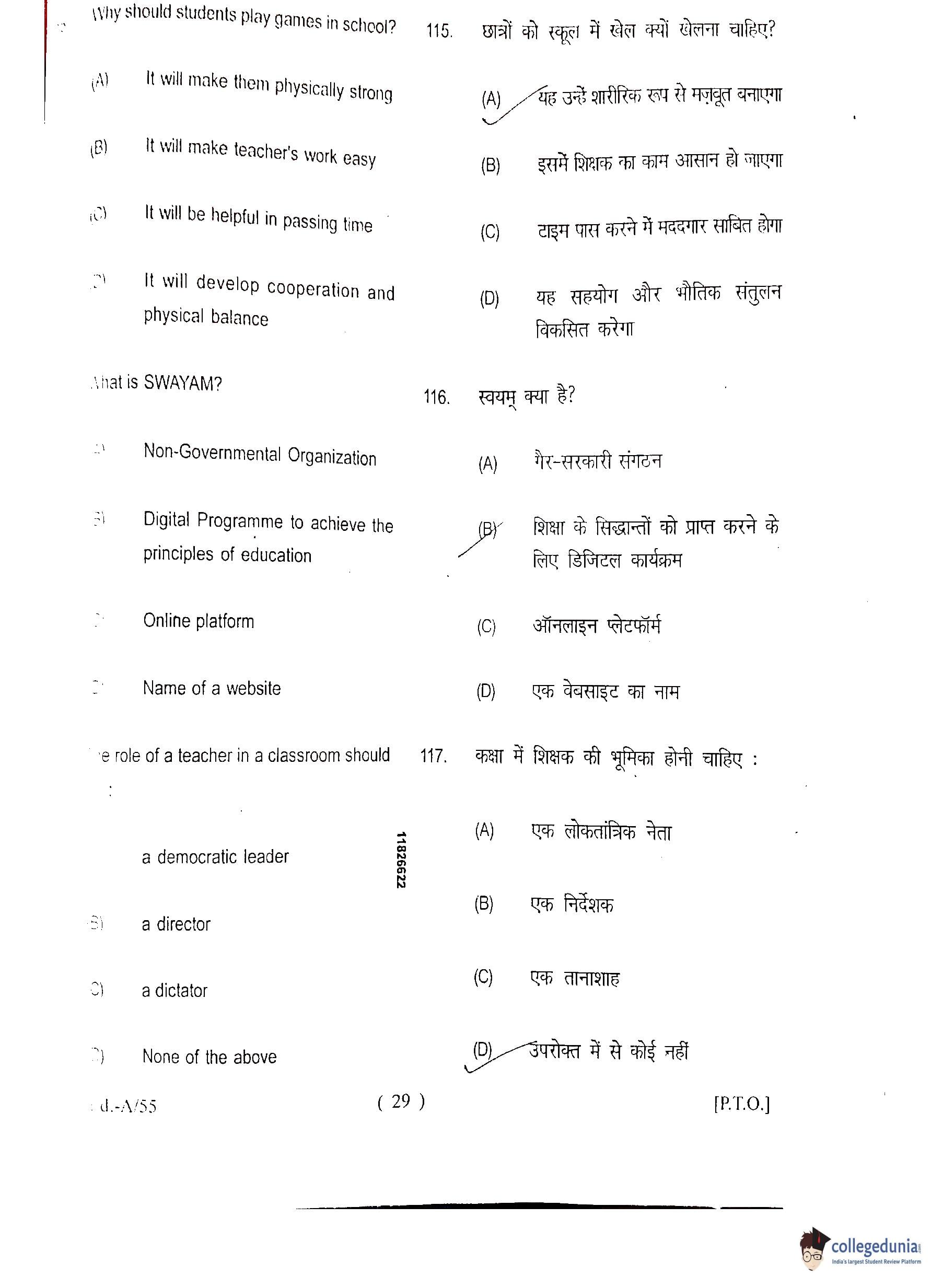
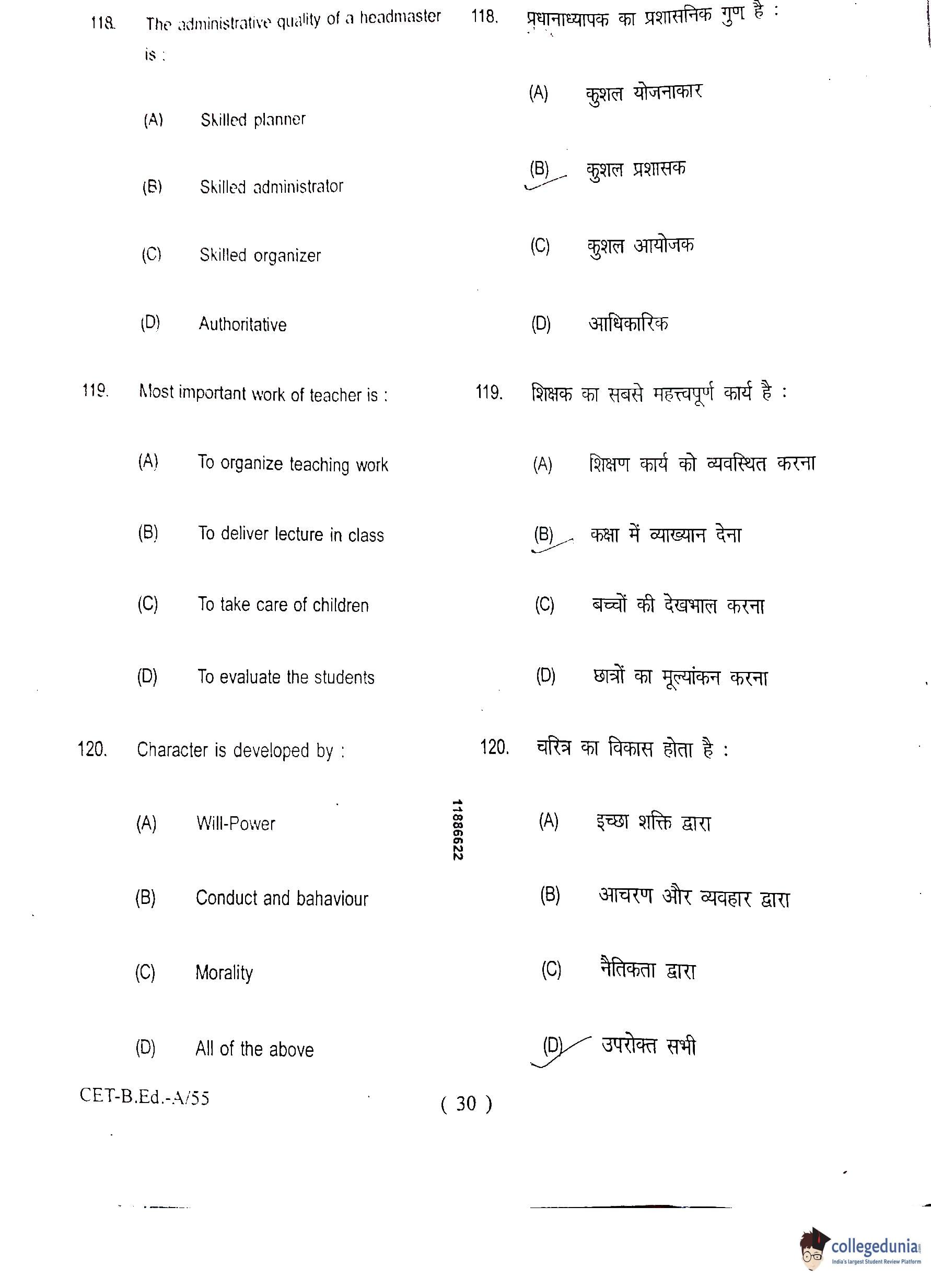



































Comments